#this is basically a direct quote from osamu
Text
Hinata plays volleyball the way Osamu eats his food
#they’re both extremely happy to be doing what they love most#currently watching S4 and needed to share this#this is basically a direct quote from osamu#haikyuu#miya osamu#hinata shouyou#also: it’s ep 9 for anyone wondering :D
27 notes
·
View notes
Note
haii could i request for kuroo, semi and atsumu where their y/n is childhood best friends with opponent team members (like kuroo with bokuto) and cant help but feel cute jealous of the boys hehe
KUROO, SEMI & ATSUMU WITH THEIR S/O WHOS CHILDHOOD FRIENDS WITH THEIR OPPONENT
KUROO TETSURO
imagine the shock on kuroos face when he saw bokuto zooming past by him only to give you the fattest hug. he’s so confused when he recalls it was his first time introducing bokuto to you in a random saturday. since your boyfriend goes by the quote “bros before hoes” he decided it would be best to introduce his girlfriend for two years to his best bud. for sure, he knew the both of you could get along - but this is different. he literally saw the glimmer shining in bokuto’s eyes when he saw you and he couldn’t help but grind his teeth from jealousy. kuroo didn’t want to show it, so he’s pretty good at hiding his emotions, shielding the annoyance behind his cocky smile as he hears from you that bokuto had been your childhood friend, basically saying the both of you grew up together. going through the group date, your laugh seems to increase every hour with bokuto and kuroo just.. feels like a loner. not that he’s emotional about it, he starts to get irritated to the point where he starts with a deadpan before reminding the both of you that he’s still there, screaming, “HEY! YOU GUYS ACT LIKE I DON’T EXIST!! I’M STILL HERE Y’KNOOWWW” he waves his arms around like a maniac and bokuto laughs at his remark, poking fun at the raven haired as he only responds with an eye roll. he merely and shamelessly admits he wants your attention all to himself and that he gets jealous whenever you avert all yours to bokuto. in the end you decided to cling onto your boyfriend the whole time, gaining back the chirpy and cocky kuroo tetsuro.
SEMI EITA
mf squints and stares quietly when he sees you congratulating karasuno’s setter. all that comes into his mind is what the fuck? why is y/n hugging number 9 like a godamn friend? his gaze starts to harden when hinata comes to the view, jumping at your presence when kageyama tells him you’ve known each other since you were babies. the thought ticks semi off and he’s just standing beside you, arms crossed with the usual pout he wears. he then notices how comfortable kageyama is to you, even going by calling your first name and you go by the same as well. he just seems as confused and ticked off with the way kageyama blushes when you compliment his setting skills and semi is like “-.- i’m a setter too...” then scoffs and walks away, catching you off guard. you swift off to say your last goodbyes with kageyama and hinata, jogging towards the direction of your boyfriend. then hugging his arm when you reach him, clueless of how he’s acting. when you approach the rest of the team tho, reon immediately asks what happened and you’re like “??? nothing happened?? why???” and he responds by pointing your boyfriends’ stone cold face. you tug semi’s arm to call for his attention, and he looks down to you, nearly cooing at how adorable you look. “are you mad?” “....” “eita??” - no, he doesn’t say anything. he never wants to admit it. so he just forces you to stay by his side throughout the whole bus ride, never letting you go. you were still confused by his actions, but you love his clingy side anyways
MIYA ATSUMU
eyebrows hunched, eyes squinted and confused in the inside. the team was on their way to the bus and before anything else, he sees you making your way to karasuno’s team, striking a conversation with kageyama tobio. he hums at the sight and nudges osamu beside him, pointing to your direction. “i thought ya knew? apparently karasuno’s setter and y/n used to be childhood friends. they go back through loooots of years ya know?” osamu says as a matter of fact and atsumu gasps in immediate response, “HA?!!” then osamu murmurs under his breath how dumb his brother could be - but atsumu could care less, the fact that he realised that you’ve been friends with his rival SPECIFICALLY kageyama tobio irks him more than anything. he doesn’t know why, but he sees the way kageyama blushes when you approach him and the team. mf narrows his eyes and couldn’t do anything else but stare. doesn’t get why he feels annoyed, he just wants to carry you back to the bus to get this over with. it doesn’t give much help when he sees you and kageyama hugging. he fists his jacket so tightly YO. as you run back to him, he keeps a stern gaze at kageyama - who accidentally made eye contact with him, and only bowed in respect(he’s so cute aaa). when you’re already by his side he just pulls you closer, murmuring something under his breath while you couldn’t comprehend what he was saying. when you ask tho, he doesn’t reply, but instead wraps his arm tighter around your waist. it doesn’t bother you, the whole bus ride goes like this and you don’t mind a clingy boyfriend
#my writing feels a lil meh idk HEHDHSHA#i hope you guys love it tho :(#haikyuu!!#haikyu#haikyuu#inarizaki#miya twins#miya atsumu#atsumu#haikyuu atsumu#nekoma#haikyuu kuroo#kuroo tetsuro#kuroo#shiratorizawa#semi eita#haikyuu semi#semi x reader#kuroo x reader#atsumu x reader#semi fluff#kuroo fluff#atsumu fluff#inarizaki x reader#nekoma x reader#shiratorizawa x reader#shiratorizawa scenarios#inarizaki scenarios#nekoma scenarios#haikyuu imagines
488 notes
·
View notes
Text
youtube
Watch the American Climate Leadership Awards 2024 now: https://youtu.be/bWiW4Rp8vF0?feature=shared
The American Climate Leadership Awards 2024 broadcast recording is now available on ecoAmerica's YouTube channel for viewers to be inspired by active climate leaders. Watch to find out which finalist received the $50,000 grand prize! Hosted by Vanessa Hauc and featuring Bill McKibben and Katharine Hayhoe!
#ACLA24#ACLA24Leaders#youtube#youtube video#climate leaders#climate solutions#climate action#climate and environment#climate#climate change#climate and health#climate blog#climate justice#climate news#weather and climate#environmental news#environment#environmental awareness#environment and health#environmental#environmental issues#environmental justice#environment protection#environmental health#Youtube
17K notes
·
View notes
Text
"Man fears death and yet, at the same time, man is drawn to death. Death is endlessly consumed by men in cities and in literature. It is a singular event in one's life that none may reverse. That is what I desire."
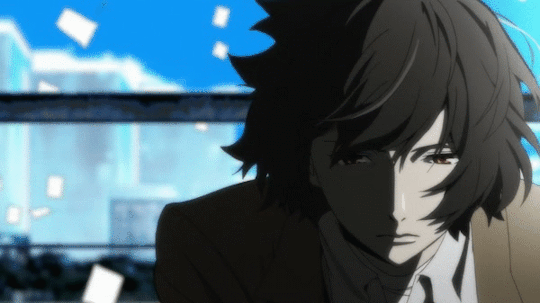
Character Analysis: Dazai Osamu
Age: 22 || Ability: No Longer Human
I've done a lot of research concerning Dazai's character because of how complex he'd initially appeared to me. It is still a question as to what his personality type is; some say he's an ENTP while others argue that he's an INTJ, and his enneagram would most likely be 7w8 (The Realist), but that isn't the thing I'm going to focus on.
According to general databases and fan analyses, his temperament is dominantly melancholic. A person's temperament is basically how they react to and live in this world. For those of you not interested in such details, don't worry, I'll get to my point.
The melancholic behaviour is characterised by individualism, self-reliance, and reservation. People of the melancholic temperament are described as having been overcome with sorrow and depressive thoughts, which is beyond the feeling of "just being sad."
Nonetheless, they are generally calm beings, with a tendency to hide how they truly feel by keeping their composure, even in events that demand severe reaction otherwise. Other aspects of melancholic temperaments is that they are absorbed in the cruelty and tragedy of this world, and tend to get lost in their thoughts.
Sound familiar?
Dazai is seen to be as the comic relief of the adaptation, and he'd never fail to bring about a sense of lightheartedness to relieve the serious moments; we all know that for sure. Remember the time both him and Kunikida found Nobuko Sasaki in that godforsaken hospital, and how Kunikida asked him about his opinion on the current state of affairs?
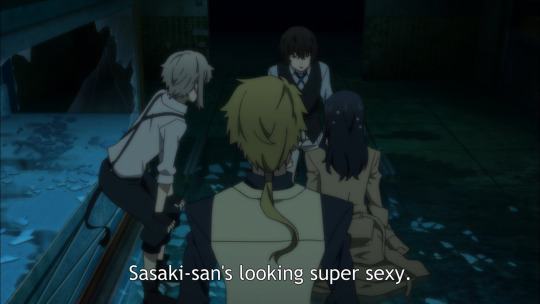
But, despite having developed a calm and serene personality, Dazai's dark side was more apparent during the Dark Era. There was a type of intimidating and arrogant flair evident in his behaviour, or even on his face. It was the type of demeanour that came off cold and terrifying to the rather unlucky people he dealt with. In a moment's notice, they could literally die by his hands. And I believe most of them usually did. It was during this time, he was more brutal and vicious. He lacked remorse. Plus, Dazai's suicidal ideations were more dense during this Era, and his suicidal tendencies did not do anything to alleviate the depth of how dark his character was posed to be.
Side note: Unfortunately, people misunderstand this 'depressed' part of Dazai; they minimise his character so much to the point that people use only a single word to describe him: suicidal. He is, in fact, so much more than that. I'll elaborate more on that in a while.

"Hey, Odasaku, do you know why I joined the Mafia? I joined the Mafia because of an expectation I had. I thought if I was close to death and violence—close to people giving in to their urges and desires, then I would be able to see the inner nature of humankind up close. I thought if I did that… I would be able to find something—a reason to live."
Dazai's approach to life is that of an aimless soul, weary of the world's oppressions and exhausted from the concept of living itself. Nevertheless, what he said above about having an expectation made me realise something: he had a goal, which he wasn't that enthusiastic about achieving—seeking for a reason to carry on with life. So he joined the Mafia.
And there, he met Oda Sakunosuke.

Despite how resilient Dazai carried himself to be (especially during the Dark Era), this specific excerpt stands in direct opposition of how he effortlessly embodied all things daunting:
"With every step I take, I feel as though the earth has opened up into a bottomless pit as I fall endlessly. As Dazai pointed to his forehead and approached the muzzle, the look on his face – like that of a child about to burst into tears – had already been branded upon my eyes."
- quoted by Oda Sakunosuke, excerpt from Dazai Osamu and the Dark Era Light Novel.
When I read this, it sent my mind into a spiral of despair and confusion. It was so vague, yet it made so much sense. Dazai was desperate to escape from this life, but part of him seemed to live in conflict with his desire for death. I won't elaborate more on this, because this specific excerpt has personal meaning to me, as I'd expect it to have for others as well; so I wouldn't want to ruin anyone else's perception on it.
Back to my point: Odasaku was one of the only characters who managed to interpret the complexity of Dazai's mindset and was able to compartmentalise the specific details of his persona that made Dazai the way he was. Oda knew that Dazai wasn't just suicidal.
"For most things in life, it's harder to succeed than fail. Wouldn't you agree? That's why I should attempt suicide rather than commit it! Committing suicide is difficult, but it should be relatively easier to fail at attempting suicide!"
Others boasted about how he was just a suicidal maniac, and that was only because of how good Dazai was at concealing his own feelings whilst flamboyantly priding himself in new, risky techniques, which he sometimes elaborated on. But Oda, on the other hand, saw through his jokes, and empathised with his friend, never wanting to ever barge into his vulnerability without Dazai's permission, but still trying to be there for him.
"Listen. You told me if you put yourself in a world of violence and bloodshed, you might be ale to find a reson to live. You won't find it. You should know that. Whether you're on the side that takes lives or the side that saves them, nothing beyond your own expectations will happen. Nothing in this world can fill the hole that is your loneliness. You will wander the darkness for eternity."
Notice how Odasaku recognised Dazai's despair, before Dazai even dared to acknowledge his very own emotions? That was why, at Oda's death, he took the initiative to uncover Dazai's bandaged eye to show him that there was no use in concealing his feelings anymore.
Odasaku's last words to Dazai was to "be on the side that saves people," for he was aware that even though Dazai didn't believe there was a clear distinction between good and evil, he thought that perhaps Dazai would find meaning in his life, even if it was just a little bit of purpose.
In Dead Apple, we briefly relive this moment, but I'll write more on that some other time.
And when Dazai joined the ADA, he loses that dark side to him. No, wait, let me rephrase that: he loses a part of that dark side to him. He eliminated the raw sense of bitterness against the world from his face, and instead, he is seen to be a little more passive, and a little more adaptive. No doubt, he still does explicitly state his desire to die, but his wishes are very specific, if you know what I mean.
And a few years later, his journey with Atsushi began.
Atsushi and Dazai's relationship is just one of a kind. I think it isn't a matter of whether Atsushi needed Dazai, or whether Dazai needed Atsushi. It's the fact that they both needed each other. It's the way they both worked hand in hand, and how they sustained each other in ways they were lacking.
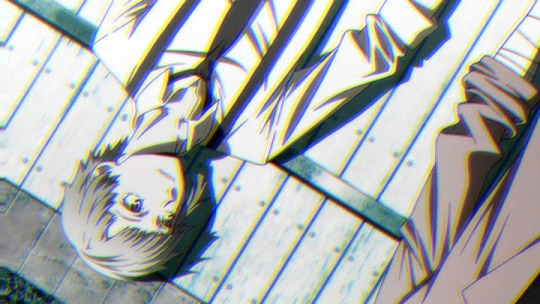
The two were polar opposites, but they had a tender kind of warmth embedded in their protectiveness for each other. Atsushi was just as lost as Dazai, but somehow, they worked together just fine. It was like their duality was meant to be. It was the type of symbiotic relationship, where their care for each other was implied, but very deep.
Does this also sound familiar... perhaps, in relation to Dazai's friendship with Odasaku?
Side note: Oda and Atsushi have the same enneagrams, which is Type 2, 'The Helper.'
There is a sort of balance that is brought about by two opposites. Odasaku taught Dazai many things, and I believe Oda learned a lot about a man's life from the way Dazai lived out his life with the innate desire to die. Atsushi sought for the right to live, while Dazai searched for a reason to live; in addition, Dazai validated Atsushi's feelings, and Atsushi was able to acknowlegde the amount of pain Dazai was going through.
Despite how Dazai's perspectives and beliefs stood in contrast with those of Oda's and Atsushi's, a type of inseparable bond connected the man who no longer felt like he was human, to the people who was the most human.
No Longer Human in the Japanese romaji is 'Ningen Shikkaku.' Ningen means "human," and Shikkaku means "disqualified." The late author, Dazai Osamu, wrote the book No Longer Human. He had gone through the rough throes of trauma and wrote this book as a semi-autobiography, whose plot was centred around a man who faked happiness, for he was tainted by the truth that everyone around him was fake themselves. He turned his life into a joke in order to protect himself from the delusions of this world.
This brings us back to the melancholic temperament, where a person was too deeply immersed in the sad truths of reality and the world itself.
And that's what Dazai's character and ability is based on: being disqualified as a human being, because he wasn't well-versed with what being human was actually like. The fabrications of being human sprung up all around him, but he wasn't willing to be fooled by how ingenuine the world truly was.
“I am convinced that human life is filled with many pure, happy, serene examples of insincerity, truly splendid of their kind—of people deceiving one another without (strangely enough) any wounds being inflicted, of people who seem unaware even that they are deceiving one another.”
- excerpt from Dazai Osamu's No Longer Human.
People who don't feel human emotions or don't react to circumstances the way humans do have a variety of ways of explaining how they feel inhuman. They are highly intelligent, which separates them from the average class of humankind, since they've analysed and untangled the truths of life in order to attain understanding, which they value above all else. But, this understanding of the world and its painful truths results in a deep kind of sorrow, which only a few people can seem to empathise with in order to help them out with that burden.
“Pain and suffering are always inevitable for a large intelligence and a deep heart. The really great men must, I think, have great sadness on earth.”
-excerpt from Fyodor Dostoevsky's Crime and Punishment.
Don't you think that this deep sorrow that lies in the heart of the intelligent, makes them the most human of all? They're too human, to the point where they don't feel human. Perhaps, it is a type of defence mechanism, where the mind numbs the heart from feeling normal human emotion, because logically breaking down such concepts is easier than feeling them. But it comes at a price. The heart is willing to recklessly comprehend and fathom any sort of emotion, including pain in its true form, but the mind bears more pain in understanding such concepts because it seeks to decipher every single agonising detail of how complex human emotions are. The mind thinks, the heart feels. There is a clear distinguishing factor between the two. Whether feeling hurts more than thinking, or thinking hurts more than feeling, or whether both these processes work hand-in-hand to make up the reality of life itself, is up for an individual to decide.
Only a few people can seem to empathise with intelligent people who are deeply sad at heart, in order to help them out. As for Dazai, it was Atsushi and Oda. They never took away the pain, but they made him grow from it; it worked vice versa, too.
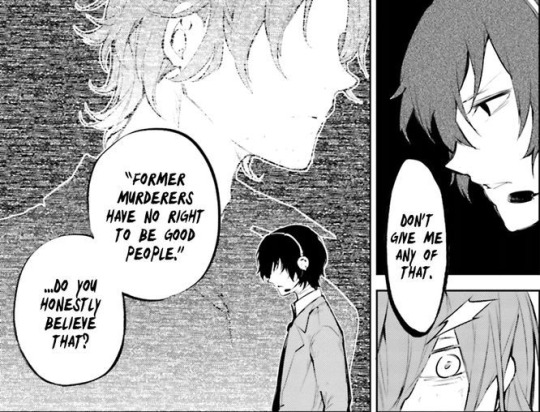
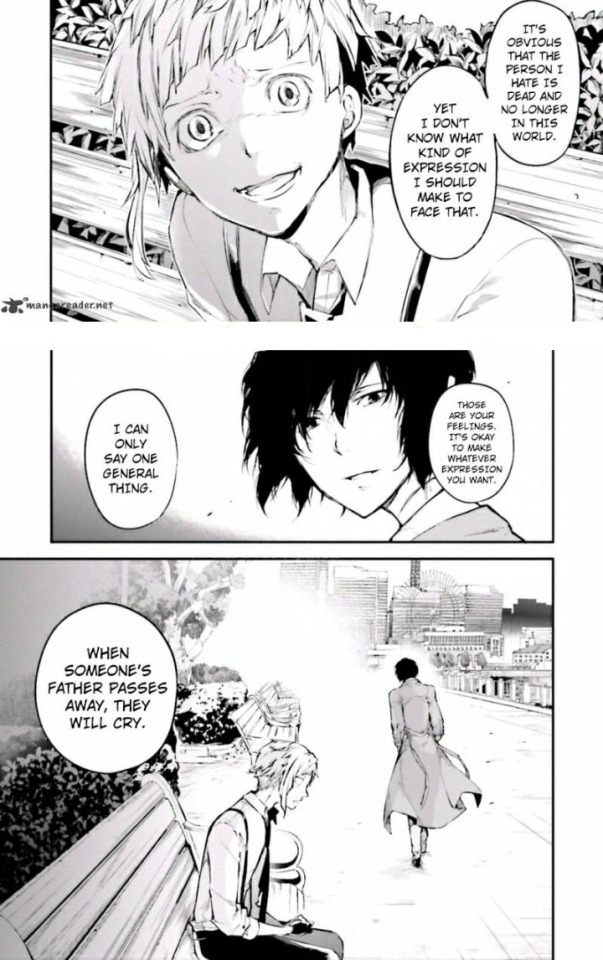
Of course, there are less tedious and more appealing aspects to the concept of Dazai's intelligence. Dazai was seen as a threat to his enemies because of how manipulation and his keen skill of deduction made up how sharp his mind was. Besides, no one could commit '138 murders, 312 cases of extortion, and 625 cases of fraud, along with various and sundry other crimes,' without having a certain level of intelligence, right?
Dazai had the moral alignment of 'chaotic neutral.' He was more focused on using his intellect to achieve the desired end results of a predicament, and he wasn't afraid to use the wrong means. A famous example was when he deflated the airbags of Ango Sakaguchi's car in order to gain the assured protection of Kyouka Izumi.
Justice is a weapon. It can be used to cause harm, but it cannot protect or save others.
Another example was when he blew up Chuuya Nakahara's car.
Just kidding. That was just a simple pastime (;・∀ ・)
His moral alignment points to what Oda said about him: the part where he mentioned that Dazai didn't really see any difference between good and evil. As long as his ends were achieved, especially if it were in the benefit of his fellow colleagues, he wasn't afraid to exploit, threaten, or endanger others' wellbeing. Because, at the end of the day, the end result triumphed the morally bad methods utilised to achieve it, correct? He always had a reason for his motives and actions, even if those actions were evil and inexcusable.
(eg. action: the psychological abuse he bestowed upon Akutagawa Ryunosuke.
motive: to enable him to hone his own ability favourably and to curb his arrogance)
But the consequences of one's actions will always catch up with a person, no matter what heights they've achieved.
Okay, we're reaching the end of my rambling very soon, I promise.
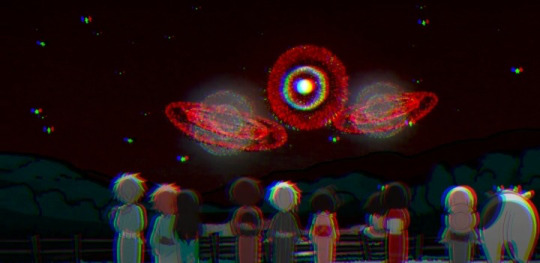
“If I had to go, I’d like to go out just as beautifully.”
“I’d prefer you don’t go.”
This part of the post is highly inspired by iwachuwu!!
An important factor of Dazai's development is highlighted BSD Wan's episode 10:
I'd like to appreciate that this scene focuses on how much Dazai actually means to Atsushi. When Atsushi responds with "I'd prefer you don't go," he said it lightheartedly for he thought Dazai was joking. But he wasn't. And once Atsushi absorbed the fact that Dazai meant what he said, he was overwhelmed with anguish at the thought of ever losing Dazai. Dazai, on the other hand, had a sense of longing on his expression. There was that look of pure desperation on his face. He was so desperate, yet he knew he couldn't act on his desperation due to a promise he'd made to someone dear to him. But keep in mind, Dazai is unpredictable, so we can never be sure of what's going on in that headspace of his.
Nevertheless, this time, Atsushi recognised Dazai's suffering, as no one usually cared to do, and Dazai didn't put in any effort to hide how he truly felt, as he habitually did. And this mutual emotional connection happened countless times during all the times Oda spent with Dazai as well.

To summarise,
Dazai's character had been carefully wired and patterned out in a way only a few would put in the effort to understand. Dazai was more than just suicidal; he was a being wandering from place to place with no specific aim. He was too smart for his own good. Dazai understood too well of how the world worked and deemed it void of any sort of hope.
Side note: Yes, the truth does come at a price, but it all comes down to how a person understands the truth. As for Dazai (both character and the author he was based off upon), well, it was quite tragic. But that's the way it is for some people, I suppose. But everyone has a different path to travel on, remember that.
His transition from working with the Port Mafia to the Armed Detective Agency was proof of how well-executed his character development was. It was two different personas morphed into what he is today: a womaniser with questionable morals a person who is still standing even after the rough refining process endowed upon him by the realities of this life.
However, he had people along the way come and teach him a thing or two, which perhaps made his life a little more interesting. Perhaps these people were passing clouds that hid the void out of sight for just a moment, and Dazai was always seen to be grasping on to these moments, and letting them go whenever it was time to let go.
His outlook on life makes his intellect look all the more intriguing. It shows that not only does his intelligence contribute to his own wit and shrewdness, but also the practical sense of realism that explains how tired he is of the concept of living because of the truths there are to bear.
However he's enduring the pain right now is by far the most bravest thing a person could commit themselves to doing. It takes courage, and it takes strength, but only a few would ever take the time to recognise such efforts.
Dazai has one of the most beautiful character developments, but I do hope that the development doesn't reach its end anytime soon.
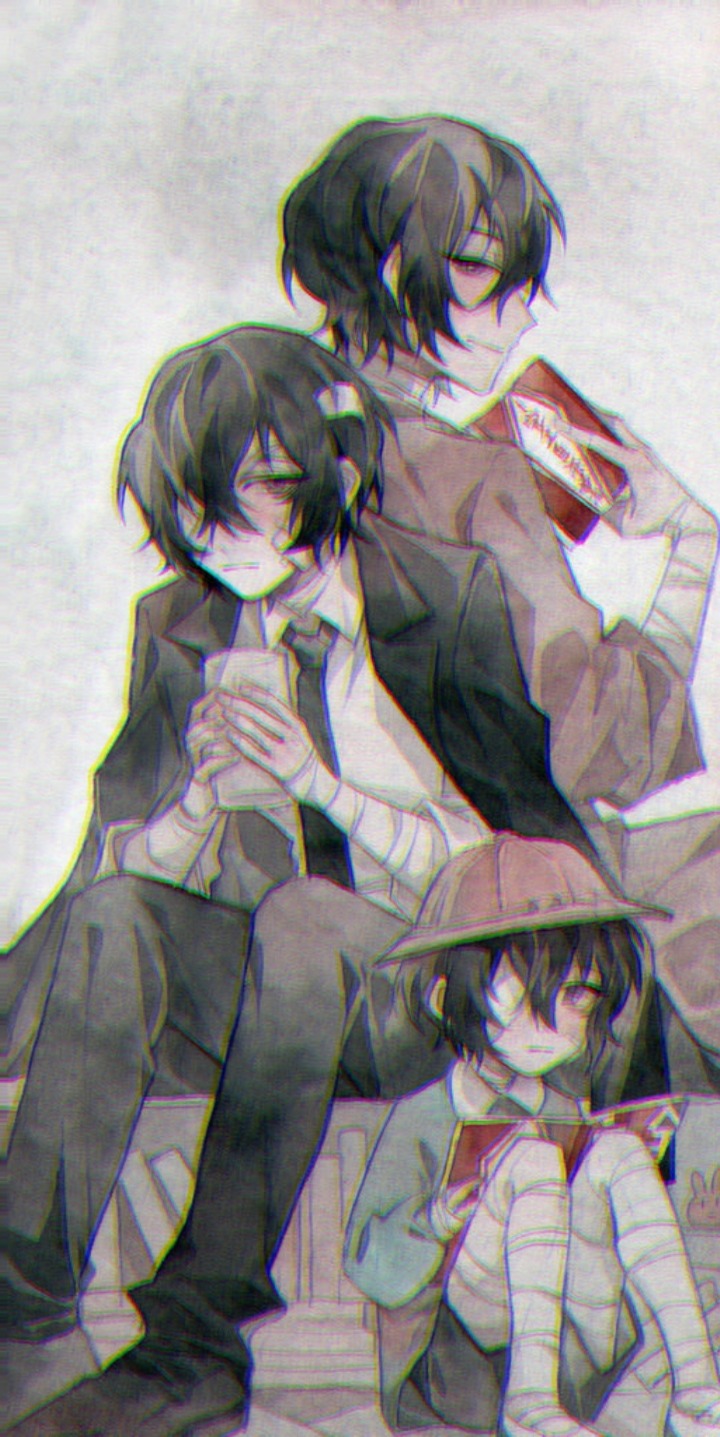
fanart credits: @S7dOZPN3jWBB6cW on twitter
“Now I have neither happiness nor unhappiness.
Everything passes.
That is the one and only thing that I have thought resembled a truth in the society of human beings where I have dwelled up to now as in a burning hell.
Everything passes.”
excerpt from Dazai Osamu's No Longer Human.
#bsd#bsd dazai#bungo stray dogs#bungo stray dogs wan#bsd wan#bsd dazai osamu#bsd characters#literature analysis#literature#dazai osamu#bsd odasaku#bsd atsushi#bsd analysis#bsd atsushi nakajima#.ryley.speaks
253 notes
·
View notes
Note
PMMM?
Oooh, OK then. So I actually wrote an Animation Night post on Madoka, back on Animation Night 10 - hard to believe that's 81 weeks ago now. Back then, though, my posts were much shorter and I didn't discuss the production in much detail. However I did end up talking about SHAFT again later in the post about Kizumonogatari on Animation Night 51.

Anyway, I love Madoka. I admit, my engagement with the series has just been the original anime and Rebellion, and not any of the expanded world of gacha games and manga and the spinoff anime adapting the gacha - but I would rank Rebellion as one of my favourite animated films and I can't wait to see what they do with the upcoming sequel.
Last time I wrote about Madoka, I mostly wrote about Gen Urobuchi. I generally speaking think he's an immensely talented writer and I've enjoyed basically all the stuff he's worked on from Psycho-Pass to Fate Zero (yet to watch through Kamen Rider Gaim or play Sayo no Uta but I hear great things), but Madoka wouldn't be half the show it is without the incredible design work of Ume Aoki, distinctive direction of Yukihiro Miyamoto [and Akiyuki Shinbo overseeing all SHAFT projects, but see below], fantastic animation of too many key animators to name, gorgeous music of Kalafina and of course the absolutely brilliant Jan Švankmajer-influenced [Animation Night 50] collage animation of the incredibly talented duo Gekidan Inu Curry [see sakugablog for a nice retrospective of them].
The Madoka series excels in choreography and storyboarding - the classic austere, geometric SHAFT environments and striking camera angles, and the abstracted dance-like action sequences in which aesthetic elements and symbols flow into each other. And then they kick that up another notch or several in the movie, which indulges fully in Inu Curry's style. I still consider it some of the most beautiful sequences of animation set to music I've ever seen.

Anyway, I've only seen a bit of the SHAFT oeuvre (alongside Madoka, that's Bake- and Kizumonogatari), although the story of the studio is fascinating, like something out of a play - the charismatic Akiyuki Shinbo and his friends reorganising a fairly minor studio into one of the most distinctive of its time. Let me quote kVin (who else?):
The task Shinbo received at SHAFT wasn’t simple: he wasn’t going to direct a new series, but rather the whole studio. He became an overall supervisor of their entire output, while also guiding younger artists to make sure this style would live on. This marked the beginning of his unusual moonlighting, juggling jobs in a way that didn’t really allow him to do as much classic directorial work. To date, Shinbo has never been the sole director of a SHAFT series because he can’t. But he didn’t face this crazy challenge all by himself, of course. With his good pals Tatsuya Oishi and Shin Oonuma they formed the appropriately nicknamed Team Shinbo; a group of artists with compatible sensibilities, who had worked together in the past, and shared the desire to construct a new SHAFT.
kVin notes that the SHAFT style is an heir, through the influence of artist Nobuyuki Takeuchi who had had a significant role on Utena, to an incredibly influential director I've still yet to give a proper discussion on Animation Night, Osamu Dezaki, by way of - of course - the master of symbolism-dense, technically avant-garde anime, Kunihiko Ikuhara. I'll save a full discussion of that for another time, though. In any case, this was successful - perhaps too successful. Many of their best animators got caught up for years in the sprawling Kizumonogatari project, while kVin and other commenters more familiar with their work say the SHAFT style, once bold and innovative, became frozen in and lost its original contextual meaning, and some years later many SHAFT staff ended up leaving the studio for less overbearing work environment.
Madoka came just two years after Bakemonogatari, though, so the Team Shinbo style was still plenty fresh. Not surprisingly, it was quickly a huge hit. In Western fandom, it kind of became that meme show, where the magical girls have guns and being meguca is suffering. There's a bunch of extremely bad misreadings out there (it's grimdark! it's a 'deconstruction'! and the backlash to that - didn't you hear, gen urobuchi wants little girls to not have hope!) but that's just how anime fandom is I guess. It's certainly in dialogue with other magical girl shows, but to me it seems in a clearly appreciative way. Thematically, it's frankly not too far afield from something like Sailor Moon.
But you've asked for me to answer an ask meme, so let me do that instead :p
haven’t heard of it | absolutely never watching | might watch | currently watching | dropped | hated it | meh | a positive okay | liked it | liked it a lot! | loved it | a favorite
don’t watch period | drop if not interested within 2-3 episodes | give it a go, could be your thing | 5 star recommendation
fav characters: Homura - more on that when we get to 'unpopular opinion'! - and Kyōko, I generally really like the concept of a burned out cynical traumatised magical girl lol
least fav characters: is it too easy to say Sayaka's cardboard violin-playing boyfriend with nonspecific anime disease whose name I can't even be bothered to look up? I guess that's the whole tragedy of her character, she wants to save this boy who just resents her for it, but you can do so much better Sayaka!
fav relationship: haha well Homura/Madoka is obviously the central framing one innit, but actually there are dynamics I really like here, especially in Rebellion. again, more on that in 'unpopular opinions'. outside of that, I think you could write pretty good fic of just about any pair of girls. They hint a bit at Sayaka/Kyōko during the last big fight sequence in Rebellion (possibly more earlier? it's been a while?) and that's cute. I admit I'm not much of a shipper these days.
fav moment: There's many I could name, but one I keep coming back to is the sequence in Rebellion when the magical girl squad deploys and each of the girls gets a brief abstract sequence illustrating their vibe. The music and imagery is sooo good here. I also love the gunfight later in the film with the time-frozen bullet trails. And the incredible climactic battle when the whole world breaks down around Homura as she realises the truth of what's going on and becomes a witch again. Am I just naming the whole of Rebellion at this rate? OK, I admit it, years on in which I've watched literally hundreds more animated films, I still think this one's great.
headcanons/theories: This is clearly a redemptive headcanon that's not especially well signalled by the text, but the reason for all the nonsensical stuff about entropy and ancient aliens is that Kyubey is a low-level functionary who doesn't understand anything half as well as it pretends. The Incubators didn't cultivate human civilisation over the centuries and give us technologies, that's just a convenient lie in the moment, and Kyubey doesn't really understand what it is that they're harvesting from the magical girls very well at all. But because the girls are like, what, middle schoolers, they don't have the background to pull Kyubey up on his misunderstanding of thermodynamics lol.
unpopular opinion: OK. oKAY. let's do this again shall we. strap in. I went over this some time previously when I first watched Rebellion (good god that was hard to find, tumblr's search functions are a travesty) but my comments amounted mostly to *gestures at Stirner, who I hadn't read and still haven't*, so let's have another shot at justifying this Take...
Here we go: I still don't think Homura is the bad guy at the end of Rebellion. Which seems to be the shared opinion of every girl I know who's seen the film but in wider fandom is basically nonexistent as a take. I don't necessarily think Homura has the answer, but I don't think Madoka permanently sacrificing herself for the sake of every hurting person in the universe was a happy ending in the first place - Homura's insistence on being the one to save Madoka and her lack of imagination in trying to reconstruct the pantomime of a 'normal' life is surely an unhealthy fixation, but she's right that the situation was intolerable and something did have to be done about it. The tension between Madoka's agency and Homura's, and whether their desires and self-sacrificing impulses can be reconciled, is a productive one.
Now, the end of Madoka is something that produces endless interpretations. Back in May last year there was a fascinating discussion on here between @azdoine, @businesstiramisu and @anarcha-catgirlism getting into the characters' various saviour complexes and the possible religious readings of their arcs in the series's broadly Buddhist cosmology.
Visually, the film pulls out all the symbols in the SHAFT toolkit to suggest that Homura is as evil as she makes out - the mouth closeups, the headtilts, the cadence and tone of the dialogue. But it also gives us quite a few lines of evidence that Homura is onto something. Notably, it makes clear that Homura has not saved Madoka at the expense of all the other Magical Girls - outside her pocket universe, the Law of the Cycle still exists. Whether Madoka can truly be happy there is another question. It also gives us a very blatant image that Madoka as 'Madokami' is still suffering with an arm covered in self-harm scars:

Admittedly this film is about as visually dense as an Ikuhara anime and I don't blame anyone for not reading the implications in this very brief cut but it's fairly important, I think. Madokami may be taking the girls up to heaven, but it's a very impersonal heaven, and the strain it's placing on her is evident. Because I've increasingly caught on that a universal self-sacrificing impulse to save everyone, however understandable, isn't actually a great thing.
Even if you can't sympathise with Homura - and I admit, a lot of my sympathy comes for her rhetoric (desire over rules) more than her actions, and you could make an argument that trapping Madoka in a false pocket universe after struggling to escape one made by the Incubators and herself across the whole film is deeply ironic - overall, in any case, I feel that the ending of Rebellion is at least a very apt extension of the tragic arcs of the two characters. Not to mention a fascinating discussion point and far richer than the happy ending that was, I believe I read at one point, originally planned before Shinbo requested a darker ending.
Yeah, it is very sudden, probably too much so - that presentation does make it seem like a 'shocking twist! Homura's bad now' which is perhaps one reason why a lot of people reacted badly to it. I'm not exactly sure where they should have foreshadowed it; at least it's not like they don't spend a lot of time on it afterwards showing you just where Homura is coming from.
how’d you find it: Without Rebellion, I feel like Madoka is 'merely' a very good magical girl anime with excellent art direction, some creative twists on the format, and a darker tone than usual... with Rebellion, it's something fascinating that has completely hooked me.
So I really can't wait to see if they can keep the ball rolling in the Rebellion sequel, whenever that lands. Although the breakup of Kalafina will be a tragic blow. I don't know how you do Madoka without Kalafina.
random thoughts: More a bit of trivia than anything, but as far as one of the lasting influences of Madoka, Yoko Taro asked Kimihiko Fujisaka to think of the series when designing the Intoners for Drakengard 3. Which proved to be a great decision.
I admit, there's a whole side of Madoka which I am not familiar with. I tried starting Magia Record once but bounced off what seemed to be a simple recap of the opening beats of the series - I need to give it another shot some time because there are some spectacular clips from season 2. Per some of @azdoine's posts which I only vaguely recall, it sounds like they've been monkeying around a bit with retconning some of the themes and logic of the series which would be a shame but whatever, I don't believe in 'canon'.
Hope that satisfies you as an answer, anon!
15 notes
·
View notes
Text
One Bad Day - League of Villains
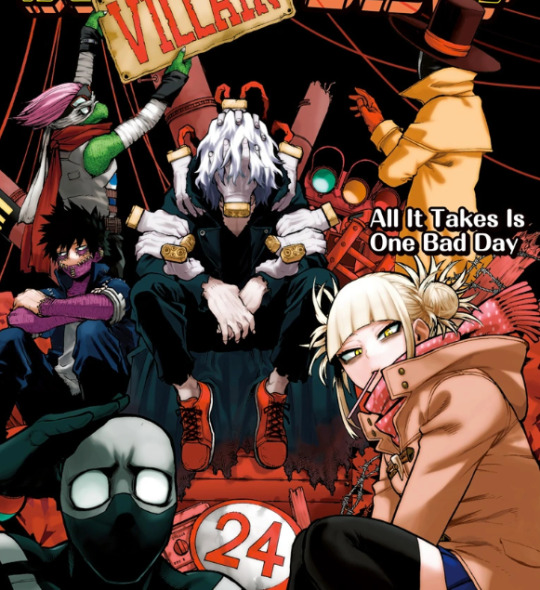
can you explain the meaning of all it takes is one bad day meaning my hero academia? I saw it used with twice but i thought that it might appy to some of the villians we saw in the manga.
In the most recent arc “My Villain Academia” the story flipped to the villain’s side rather than the heroes and we saw the world through their eyes. In that same arc, Hori made several allusions to The Killing Joke by Alan Moore, a comic that explores a darker take on the relationship between batman and the joker and one potential take on the Joker’s Character. It just like My Villain Academia is a story told mainly through the villain’s eyes rather than the hero’s, and it’s all about the narrative a villain tells himself.
What was Hori’s purpose in referencing the killing joke? Did he take inspiration from the story? Is he just a nerd making a comic book reference? Did he believes the themes espoused in the Killing Joke to be true? Let’s take a look under the cut.
1. The Killing Joke
The most logical place to start is with the material Horikoshi is referencing himself. I read the Killing Joke several years ago, and reread it for the purpose of this meta. The funny thing about the killing joke (har har) as it’s one of those stories that gets misinterpreted a lot by fans.
It’s actually a pet peeve of mine when people blame the original work itself, like saying it’s Fight Club’s fault that people misread it. The common misreading of the text is that Joker is right, that he’s actually this really deep person that sees through the lies of society. Even when the entire point of the story is that Joker is wrong, the characters even say this out loud as direct dialogue. This story is the exact opposite of subtle, it’s very in your face with it’s themes, almost too loud.
People confuse the Joker’s own personal narrative, that he sees through these things and is therefore deeper and more aware than anybody else, with the framing of the story that frames Joker as petty and shallow. But, you could have Joker wear a t-shirt that says “I am wrong and a hypocrite” the entire work and people would still misread it.
The point of this preamble being, I don’t think Hori misinterpreted the killing Joke. I do not think his reading of the story is so shallow he referenced it because the joker is a cool villain who says cool things. I hope that will show as I continue, that there is a lot of thought put into these connections. Even if it’s not a direct adaptation of the themes of the killing work the two separate works make for a really interesting comparison.

Joker says many things about the world., but the killing Joke isn’t about the world at all, nor does Joker really care about the world. The Killing Joke is not a comment on society, it’s a character study, primarily about the relationship between Batman and the Joker. It starts and ends with the titular killing joke.
See, there were these two guys in a lunatic asylum, and one night, one night they decide they don’t like living in the asylum anymore. They decide they’re going to escape. So, like, they get up on the roof and there, just across this narrow gap, they see the rooftops of the town stretching away in the moonlight, stretching away to freedom. Now, the first guy, he jumps right across with no problem but his friend, his friend daredn’t make the leap, y’see. Y’see he’s afraid of falling. So then the first guy has an idea. He says “Hey, I have my flashlight with me. I’ll shine it across the gape between the buildings. You can walk along the beam and join me.” But the second guy just shakes his head. He suh-says. He says “wh-what do you think I am, crazy? You’d turn it off when I was halfway across.”
The Joker's joke, which is an analogy of how hopeless it is for one insane man to try saving another insane man. It's so sadly relevant, Batman can't help but join the Monster in bitter laughter. The entire story is a character study of the foiling between Batman and the Joker, and how both of their actions, becoming a hero, becoming a villain, is a response to meaningless tragedy in their lives. Yet, even if Batman recognizes that they’re both victims in a way he can’t save joker, because it’s impossible for one insane man to save another.
That is the main theme, of the Killing Joke. In a way it’s a failure of empathy, because batman’s methods won’t save the joker, punching him in the face won’t fix him. That is also what I believe Horikoshi disagrees with.
The main conflict of the Killing Joke is that the Joker is trying to make a point. That he’s not that different from everybody else, that anyobdy when exposed to the meaningless tragedy of the world would go insane. That it’s the right response and everybody else, clinging to to society, and it’s made up rules are the ones who are really man.
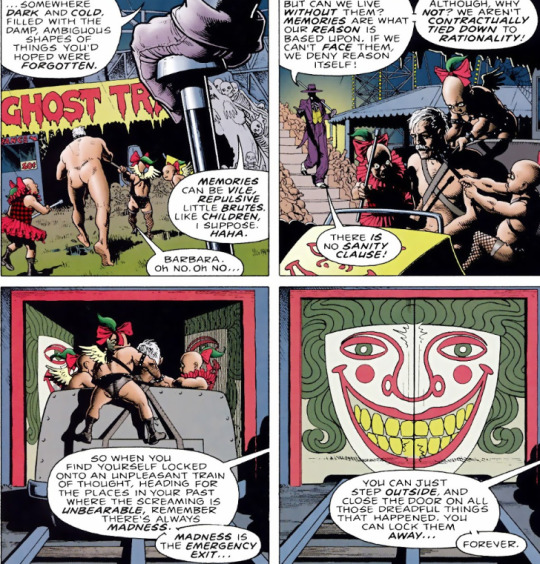
It’s basically what is called moral nihilism.
Moral nihilism is the meta-ethical view that ethical claims are generall false. It holds that there are no objective moral facts, or true propositions - that nothing is morally good, bad, right, wrong, because there are no moral truths.
Basically, because morals are made up ideas by human beings therefore morals cannot exist. The thing is while it insists there is no value to the things we believe are proper and right about the world, it’s not Nihilism or not in the nietzschian sense of the word.
See, the thing is Joker is right that all of these institutions are meaningless, that they’re not as set in stone as humans would like to pretend they are, that the earth under your feet could fall out under you at any time.
But that realization is not necessarily something that leads to evil, or even madness. Like, nihilism is very subversive of power structures. People use the idea of meaning, they use ideas, they use the way the world currently is as unfair as it is to insist that the world has always been that way, to keep in power. Therefore, rejecting what you are told by existing power structures and finding their words meaningless and thinking critically instead is something that could lead into something better. The formation of new ideas inevitably involves the rejection of old ones as meaningless.

However, the joker isn’t interested in any of that. Nothing he says is subversive of power structures at all. He doesn’t care about the injustice of the world, or the way power structures let people like him fall through the cracks. In fact, Joker recreates the same power structures he is trying so hard to subvert and laugh at.

Joker’s entire (possible?) backstory is that he was a victim of poverty that the world didn’t really care about, was utterly indifferent to, and the realization of the world’s indifference to him is what drove him mad in the end. However, the thing about the Joker is, he sucks at telling jokes. His attempted parody or satire just ends up recreating the same ideas of the society he is trying so hard to say that he’s above.
In his backstory, the Joker makes a pretty misogynist joke. While a victim of poverty himself, he looks down on women victims of poverty who sell their own bodies and try to live just like he is. Joker’s problem isn’t society itself, it’s that he’s the one being stepped on, and not the one stepping on others because he thinks it should be the other way around. A guy like him should have never ended up society’s victim, society’s punchline.

Which is why he insists that he’s normal. He’s the same as everybody else. And in a way he’s right, Joker reflects the attitudes of society, he’s sexist, he looks down at the poor, it’s implied he takes his feelings of inferiority out on his wife. He’s normal for all of those reasons, not because it would be normal to go insane.

Also, this is just a side tangent but there’s a lot of philosophy on whether normal people are good or bad which is too lengthy to get into, but whether people are born good or bad by default, normal people will carry within them the ideas society raised them in.
“You must stop your fooling around with women. You’ve gone far enough. Society won’t stand for more.”
What, I wondered, did he mean by “Society?” The plural of human beings?
No longer Human, Osamu Dazai.
Society is the plural of human beings. Joker is a part of the same society, a reflection of the same society, a response to it, just like any other person is, and in that way he’s normal and not as outside of society as he believes himself to be.
The work then goes on to make the point that while this may be our society, there are also people who try to be better even in situations like these. Gordon the entire time, tells Batman it’s wrong even if Joker is a bad person who murders people, to beat him up because police brutality is wrong.

So we finally reach the scene which Hori is quoting. Joker’s speech to Batman, the grand point that he is trying to prove. That everybody is the same as he is, they just haven’t realized it yet. That anybody would have gone mad being put through what he was put through, the revelation that everything was meaningless.


However, once again Joker doesn’t actually care whether society is meaningless or not. In fact, his actions are the opposite of NIhilism. He is trying to make a point. A point, as in, the opposite of meaninglessness. He thinks there are ideas that are correct, that there’s such a thing as being right about this world.
Which is why we see is his slow breakdown amidst his own monologue. What he really wants is to prove to someone else his perspective is correct. So that he can finally feel justified in it, and maybe because batman isn’t responding he has to pause a minute and consider that he’s wrong?

What Joker fears is true meaninglessness. So everything he does isn’t reveling in meaninglessness like he supposes, it’s the opposite of it. He’s trying to create a narrative to life, he’s trying to give it themes, he wants to teach a lesson. Joker’s views are just a reflection of the society that created him. Joker thinks everybody else is wrong, but the idea that he himself might be wrong genuinely breaks him.
Which is why Batman’s line here is so important. Because I’ve heard it before. What Joker says is no different from society. He carries the same attitudes. Society isn’t just some idea floating out there, it’s made up of human beings, people like the Joker.

So, the work of the Killing Joke itself is subversive to the idea that one bad day is all it takes to turn anyone into a villain. However, at the same time the Killing Joke is not trying to make a point about society, or insanity, or victimhood and trauma or anything like that. All of those ideas present in the work, but they are basically just window dressing because the central part of the story is a character study between Joker and Batman, two people who let their entire lives be ruined by one bad day.

However, at the same time Killing Joke is heavily flawed. Just like the joker is misogynist, etc. etc, the work itself is rife with the nineties it was made in. On that front it’s much more a product of its time than ahead of its time in any signficiant way. Like, there’s the obvious fridging of Barbara Gordon, but also as I said the point they are trying to make isn’t reflective of mental illness or trauma or anything like that. The joker went mad because he was a bad person to begin with.
See the thing is I also believe that mentally ill people are perfectly capable of being bad people at the same time. There’s nuance there. No Longer Human, by Osamu Dazai is an example of this. The main character isn’t a bad person because they are mentally ill. The fact that they are a victim of trauma never goes away throughout the book. Yet at the same time, you see the person just uses other people as things for them to cope with, they could care less about the feelings of others, they see no one else as an individual. The way they cope with their mental illness when they are given access to healthier alternatives, is what makes them a bad person.
While yes that is also a part of the Joker’s character, he’s always been double sided as a bully, as someone who is looking for an excuse to exploit others not really to make any kind of point. Which is why the ideas of mental illness and victimhood and whether society is at fault for creating people like this by the act of letting people fall through the cracks isn’t really suited to a character like the joker. This is something Alan Moore himself admits.
I’ve never really liked my story in The Killing Joke. I think it put far too much melodramatic weight upon a character that was never designed to carry it. It was too nasty, it was too physically violent. There were some good things about it, but in terms of my writing, it’s not one of me favorite pieces.
“Alan Moore”
There are a lot of ideas about society brought up in the Killing Joke, but none of them are substantial, and none of them really matter because the work itself is not trying to develop them.
However, the ideas themselves are still good which is why I like to think Hori’s work in My Hero Academia, his insistence that one bad day is what created people like Shigaraki, Twice, and Redestro is not a misinterpretation of Alan Moore’s message but in fact an interesting response.
2. Shigaraki’s Bad Day
There are a lot of connections between Shigaraki, the character and the Joker for instance, it’s pointed out right a way in the same sense as the Joker is throughout the entire Killing Joke comic, that he does not really mean what he says and he isn’t actually trying to prove any kind of point through his actions.
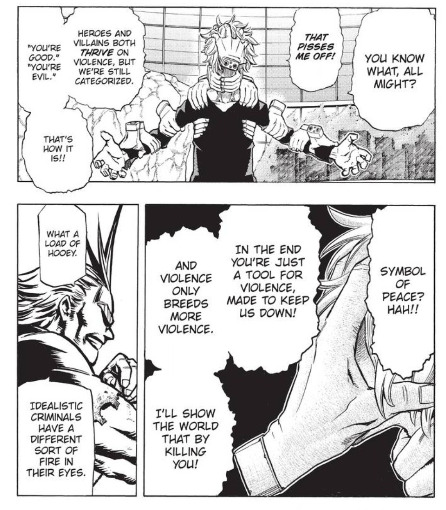
However, Horikoshi’s writing and humanization of Shigaraki is really different and takes a different direction than the Joker. Here let’s talk about good victim bad victim again.
The reason good victim bad victim is bad, because it basically tries to strip away victimhood of characters in order to render them in black and white ways. It gives the implication that reacting certain ways to trauma makes you a bad person. The feelings of the victim are entirely stripped away and they’re stopped from being seen as a human being, because other people want to fit them into a simpler black and white narrative.
Nuance is the best way to approach these scenes. So, let’s look at this scene with what we now know. Shigaraki is a victim of abuse. Not only that but he became a punching bag for his father, directly because All Might’s Master abandoned his father to raise All Might Instead. He was raised in domestic violence, and then adopted by a violent person and molded into becoming more violent raised with no stability, no home and constantly exposed to danger that would threaten his life.
So, yes Shigaraki’s words might be nonsense but the feelings behind them are still real. This is what All Might’s Mistake is, he could not care any less about the feelings that the person he is fighting has, and he just sees them as someone to punch in the face. This is also something that bites him later when he realizes that Shigaraki actually was someone he was connected to.
Of course All Might is trying to save a bunch of kids, does he really have time to listen to the feelings of somebody threatening to kill kids? Who knows. That’s the thing about reality, it is mesy and indefinite, there are more important questions to ask then whether victims are good or bad. You could also say at the same time that All Might is completely oblivious to the feelings of victims of abuse. That he still fails to see what kind of person Endeavor is, and insists he has good things to teach people, because Endeavor is a part of the same sytem that heroes is.
Anyway, the point of that tangent was to establish a good aspect of Hori’s writing, characters are people first. Shigaraki is a victim first before the question of whether he is a good person or a bad person is even asked.

Shigaraki is also, someone like the joker thinks he seees above society because he sees it from an outsider’s perspective. He views other people as clinging onto meaningless ideals and unable to see or think for themselves, because they’re too concerned with the illusion of safety.
Shigaraki also shares the same relationship with Deku that the joker does with Batman. Even though they do not know or understand each other, the two of them are set up as mortal enemies and keep fighting each other because their masters pushed them into this fight. Deku even denounces Shigaraki the same way that Batman does the Joker.

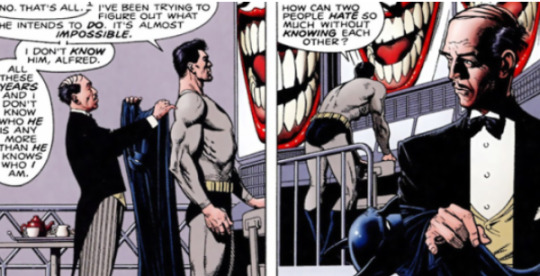
Shigaraki and the joker both experience a moment where they snap. Almost as if their entire lives have been defined by one bad day, where a lot of it amounted to coincidence. Joker loses his whole family in one day and falls in the chemical tank, Tenko’s quirk activates after a particularly bad day of abuse in his abusive household and his family is caught up in an accident, and then when his father attacks him he tries to defend himself.

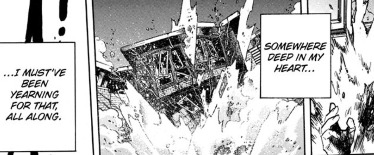
Here is the primary difference though. With Joker there’s the idea written that Joker was like that all along, that he wanted to hurt people and take out his shitty life on others, and that his madness just revealed feelings that were already there. This mostly works in the case of the joker because he’s a bully, a bad person, that’s who he’s always been.
But, Shigaraki is 1) five years old, and 2) we see the kind of person Shigaraki is before trauma.
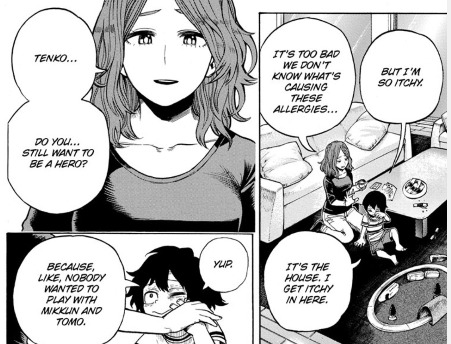

He’s a kid who is in fact, victimized by the patriarchical ideas of society. Unlike the joker who believed he deserved more, not only was Tenko literally just a kid trying to be himself and follow his own dream who was abused by patriarchical authority figure in his own house, but Tenko even as a victim still cared about the feelings of other people, fellow people who were being excluded like him and he went out of his way to look out for them.
There are absolutely no hints that Tenko was simply a bad person all along, and that he was looking for the excuse to simply act on his impulses to hurt other people and destroy things. In fact this idea itself appears in story as a narrative that All for One feeds him in order to manipulate. The Joker’s ideas appear in the story, but the one that uses them, the one that’s just a bully taking advantage of weaker people is All for One, not Shigaraki.
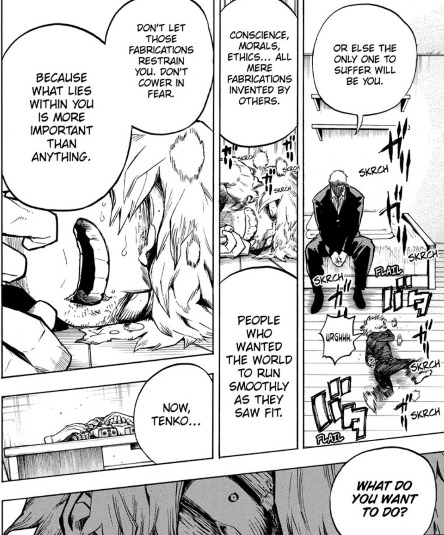
Shigaraki is deliberately raised not to have empathy for others, to only act on his own impulsive feelings to destroy, to be impulsive, to act to hurt whoever he wants, whenever he wants.
Now, I don’t know if there are truly good or evil people in this world. Good and evil might not even be real, but, at the same time jerks are real, and they’re out there in the world being jerks. For the sake of simplicity let’s just define a jerk as somebody who does not care about the feelings of other people in the least, especially when it comes secondary to their own feelings. Shigaraki does not fit that criteria.




Shigaraki listens to the people around him, he treats them with care. Even though Shigaraki suffered one bad day, and then several bad days after that, the part of Shigaraki that All for One tried so hard to destroy where he actually wants to reach out and connect to others and stand up for them is still there.
So, in a way Horikoshi is using Shigaraki for a much more empathic take of one bad day, which sort of validates both sides of the argument. Yes, someone’s entire life can be ruined by one day and they can fall through the cracks that easily and the society that was supposed to take care of them won’t. It’s a stance that acknowledges that villains are made, and trauma exists and will always affect people whether they are good or bad people.
However, at the same time that does not necessarily mean the person you are will be gone forever. One bad day cannot destroy you. The Joker’s view is pessimistic because he believes there’s no hope for someone like him, that both he and batman are completely broken and will have their lifes defined by their one bad day their entire life. Whereas, not only are the good parts fo Shigaraki still in there, but he also is someone slowly recovering from his trauma when placed in a much healthier environment. The Shigaraki at the beginning of the manga, and the Shigaraki we know now are different, because Shigaraki does not want to be stuck in one bad day his whole life, he’s trying desperately to become his own person outside of his trauma.
In the end, one bad day can in fact ruin your entire life. Which is why the message of the Killing Joke ends up coming off as a little ableist, by saying that if you were a good person you would not have let it ruin you. It’s kind of like saying that Dabi is a bad person because he chose to be a villain in response to Endeavor’s abuse, even though Shouto was abused and chose to become a hero. Like, that’s a pointless argument to make, and holds Dabi accountable for his own abuse instead of holding Endeavor accountable for the people he abused.
Shigaraki isn’t the joker, because Shigaraki is a lot more human than the joker as a character.
2. Twice’s Bad Day
The other fundamental difference between the Joker and The League of VIllains is that the Joker really is not trying to make any kind of anti-establishment point, nor does he really care about the society around him, whereas the League of Villains definitely does care. The Killing Joke isn’t actually about society, but My Hero Academia, the central conflict of the story is about the society the story takes place in, a society that basically manufactures it’s own villains.

Twice, just like the joker, and just like Shigaraki is someone who is driven insane by one bad day. Specifically because society as a whole neglected him and let him fall through the cracks. He’s also like the joker, someone who while at the same time as being insane, genuinely is able to observe the world around him from an outsider’s viewpoint and pick up on things. He tends to be more aware than the other characters, even while babbling like he’s just comedic relief.

However, Twice’s views are also in direct contrast with the Joker’s. Twice himself believes that it’s fine that normal people are able to enjoy their normal everyday lives, and that people exist in this society who have no problem fitting in at all.
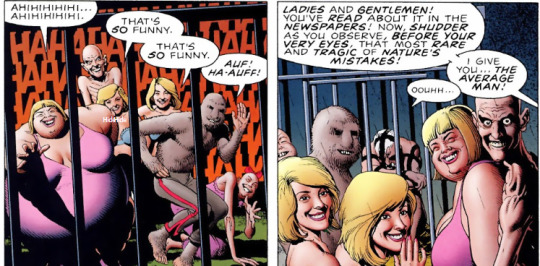
Whereas, the joker loathes normal people and anyobdy else who can fit into society in a way that he cannot. He dismisses them all as idiots and laughs at them. That’s because, as a character Twice is far more self aware, unlike the Joker who is in denial of his want for people to understand him that’s exactly what Twice wants and admits to wanting. He knows his views are outside of normal society, so instead of trying to prove that he’s right, Twice seeks out people who are like him.

He also knows that society will not try to save or sympathize with a person like his. The thing is the things Twice is saying aren’t grandiose claims to the true meaning of the world or seeing through everything, instead they’re much more grounded observations that are true because My Hero Academia is trying to prove a society that has failed people like Twice.
Twice’s story even mirrors the joker in several ways. He is basically the same, a guy down on his luck, dealing with poverty who eventually resorts to crime when all of his other options fall through.
Let us count the actual societal injustices that are present in Twice’s Backstory. Twice obeyed the law, and the person he hit did not. However, because the person he hit was a rich person and Twice was not, Twice was the one who was punished instead. Almost as if laws that supposedly protect everybody favor rich people and people with power already.

The foster system left Twice alone when his parents died from a villain attack.

Not only is Jin given a permanent record which affects all of his future employment because society treats felons like they are not people, but rather a lower class, but he also was fired from his job because someone abused the power they had in society to carry out a personal grudge against Twice. That person got away scott free and Twice lost his entire livelihood.
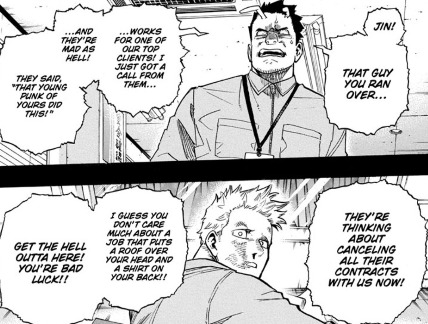
Twice retaliates and he turns to crime in order to survive, and yes there were better ways that Twice could have responded, but the only reason that Twice was put into the situation in the first place was several abuses of power in society directed towards him. People like to insist over and over again that victims should always just remain good people forever, without lashing out, or hurting others in order to survive but then not say how they are supposed to survive in those situations.
Twice however, takes full responsibility for his actions and realizes that his lashing out, his decision to live selfishly and steal and try to live the good life abusing his quirk was not what he wanted at all. His actions result directly in his bad day.

However, Twice too is given an option to recover. All it takes is one bad day, and anyone can become a villain is not the Joker trying to point in the context of My Hero Academia, it’s a statement of empathy. That Twice, Shigaraki are not alone in their trauma. That they are both able to find each other, and start to see themselves as human when they realize they were people driven to be this way and not bad people who were always this way. In Horikoshi’s writing it becomes a much more humanizing statement.
The sense of understanding that Joker is depserately trying to find in batman by proving a point, by forcing him to see the world this way, Twice and Shigaraki find in each other.

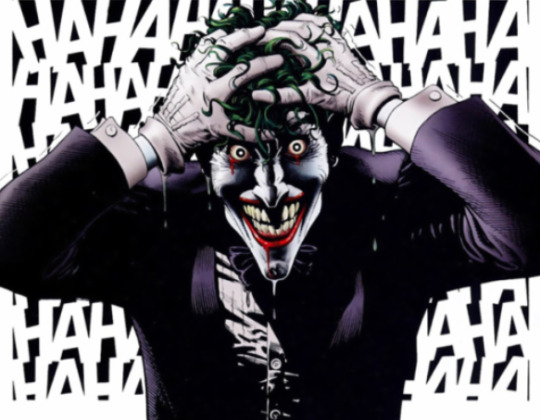
The Joker’s descent into madness is sign that he is permanently broken, whereas when Twice imitates that same pose and expression it’s used in a moment of healing for him. It’s him realizing broken as he is, he’s still here, he survived his one bad day.
As a final note, while portraying this humanizing message Horikoshi also manages to succesfully illsutrate the original point of the killing joke as well. It’s almost like having multiple examples of mental illness present in your stories, you can better explore the more negative reactions to mental ilness as well without coming off as ablist.
The commentary that Joker is a part of the society he thinks himself better in, that he repeats what he’s trying to subvert, that he entirely fails at sattire is something that is repeated in Rikiya.
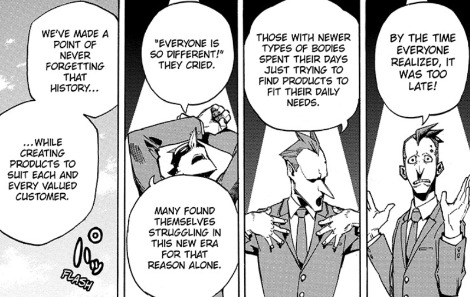

Rikiya and Joker are both capable of observing the society around them. They know the society around them is wrong. RIkiya’s ideals as Re-Destro that people should not be judged by their quirks and that quirk society as a whole tends to restrict people entirely based on their quirks, something that they are born with and cannot control, and that society should be trying to adapt to people and change rather than just putting certain people down for the benefit of the people who can fit in better.
However, both the joker and Rikiya are shown explicity not really to have attachment to the other people around them, or see them as people. They are jerks. Rikiya sees people as dispoable sacrifices to his great goal of reforming society.
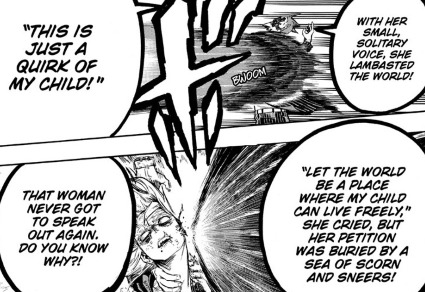
Rikiya however speaks of how evil society’s prejudgices is, and then he goes and repeats them. He looks down on the league of villains for being poor and disabled when he himself is a wealthy businessman. He suggests that Shigaraki is uneducated as an insult to put him in his place.
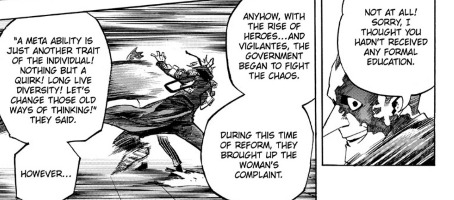
His followers who espouse how people should not be judged by their meta abilities, judge the league as worthless and unworthy people because of their quirks.
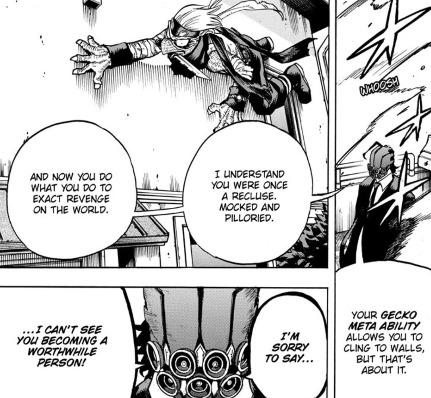
Destro says not to judge people by their quirks, and then goes and immediately insists that Shigaraki can only be a bad person who wants to destroy people, because he happened to be born that way.
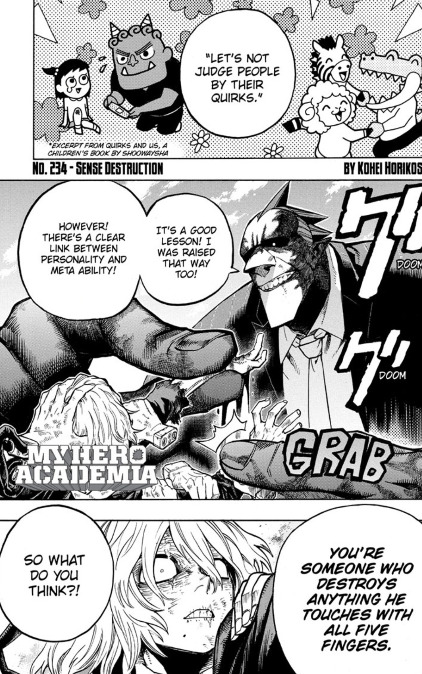
Re-Destro claims to be anti-establishment, but not only does Rikiya thrive in this exact kind of society (he’s a wealthy businessman he’s on the top of society, punching down at people who fell through cracks and were living as genuinely homeless going day to day for survival), but even if he were succesful at destroying the current society his ideals would just recreate the same unbalanced society just with him at the top.
Rikiya would create a society where people are still discriminated on based by their quirks, he would create a society where people with stronger, flashier, quirks are able to have more freedom in life, and find more success and people with weaker quirks cannot amount to anything. How is that any different from the society he’s a part of?
Rikiya is a part of the society he is trying to destroy. Yet, even he is still a victim in a way, he was raised in a cult to think that way and told that he had to believe these things because of who his father was, and he’s constantly at conflict with himself because of it.
Rikiya, Shigaraki, and Twice in addition to other members of the League of Villains who fell through the cracks, all of these characters read as responses to different aspects of the jokers character and different ideas he presented in The Killing Joke. Rather than just a reference though, it is an intelligent response, that Horikoshi clearly made these ideas his own and shows off his priorities in wanting us as the audience to forget that these characters we call villains are human first.

In the end the Killing Joke and My Villain Academia play with the same ideas to come to different conclusions. The Killing Joke ends with the idea that an insane person cannot save another insane person. Batman cannot save the joker. The joker is not someone who can be saved, and at the realization of that batman starts to strangle him and gives into his worst instincts to commit police brutality.
My Hero Academia uses those same ideas to tell a story where insane people can save other insane people. Unlike Batman and the Joker, I genuinely believe that Horikoshi is writing towards a conclusion where Shigaraki is someone who can be saved by Deku, not someone he is meant to continually fight with until one of them dies or the other.
In the end they are two different stories one of them illsutrates a failure of empathy and the other illustrates how empathy among insane people brought them together.
#mha meta#lov meta#shigaraki meta#shigaraki tomura#jin bubaigawara#twice#yotsubasa rikiya#league of villains meta#league of villains#the killing joke#my hero academia#my hero acadmeia meta#my hero academia theory#my hero academia analysis#meta
226 notes
·
View notes
Text
Deca-Dence 5 - 6 | Moriarty 3 - 4 | Yashahime 4 - 5 | Maou-jou 4 | I7 s2 5 (22) | Akudama 4 - 5 | HypMic 5 - 6 | Taiso Samurai 4 | HPGC 4
Deca-Dence 5
“…cannon won’t ignite in time!” The subbers spell cannon as “canon” later as well.
Off to the cliffside, where Kaburagi goes to die…
Deca-Dence 6
“Maybe someone intervened.” – I think Minato did, somehow.
This Death Dive reminds me of Wipeout.
Moriarty 3
I once made up a quote that goes, “When life detests you, fight back.” I think it’s also roughly along the lines of advice Albert needs.
I remembered an odd line from Macbeth: “Brother, he has killed me!” Seriously, Moriarty is scarier than some actual horror anime, I swear…Update: It’s actually “he has killed me, Mother!”, but same impact.
I had my hands over my mouth from the moment the fire began. That’s how intense this is.
This ED…doesn’t sound like an ED. It sounds like the OP for a different anime, like Joker Game or something. Also, having Saito Soma as Gentaro and Moriarty…is a bit unsettling because they have a lot of overlap but one’s basically the evil twin of the other.
Yashahime 4
“…was raised here…”
“…we can…”
I felt a heart twinge when I saw Towa tear up…man, it’s been years since I last dealt with Inuyasha properly.
“…nights where I can’t fall asleep.” – So…you’ll play it a lot then, Setsuna.
Oh, so Kirara is a nekomata? I never knew until now.
Kikyo!
According to the mythology, the kirin rules over the middle…so why is Kirinmaru the monster in the east?
Is “s***” unwarranted here? I didn’t have the volume on, so I don’t know…Going back, I think Moroha said “kuso”, but it’s still kinda weird to have a swear word in a mostly family-friendly series in a slot near Detective Conan. (Then again, Detective Conan is where I learnt “kuso” from…so my standards are probably not as up-to-scratch as they should be.)
Rin! People keep saying Rin is the mother of the girls and it’s basically the only conclusion that could be done, considering the relationship the two had…but it’s still kind of squick…(Says a person who has no problem with SGRS s2’s ending.)
Update: Someone on ANN said the teacher’s name (Osamu Kirin) being similar to Kirinmaru is sketchy and I agree.
Maou-jou 4
There’s no pun for Rocket Turtle…that’s kinda startling, actually.
I’m not going to translate the eyecatches anymore. Seems they were actually translated in the manga and someone just copies them over or something.
I’ve seen some characters use wa when they really aren’t that feminine. However, the voice Suwabe uses for the Sorceror leads me to believe this guy really is trying to be feminine, even if in just a vocal capacity.
…aw, no puns here too.
Oh no, the seal…!
…hmm? The Scissors Sorceror’s info is…we’re not allowed to look at it. That’s what the red text says.
…my brain exploded for a second when I suddenly heard jazz music. It’s a Detective Conan parody! *screams*
Iina! doesn’t really mean “Lucky!” It means more like “cool!” or “It’s good, isn’t it?”
I7 s2 5
I missed these boys!
I like the Kinako transition. It’s cute.
I don’t really like it when Tenn looks at the screen…it gives me 1st person cam vibes.
Why is Tsunashi being called “this”, anyway?
Oh yeah…mensore = youkoso = welcome.
Uh oh…is Yuki actually evil???
Riku (earth) vs. Tenn (heaven). Hmm.
I still can’t believe they don’t believe Gaku is the soba guy. It’s so obvious!
Chikuzen-ni.
Someone on staff ships Gaku and Tsumugi together…hmm…
Oh! So this is DESTINY, huh? I’ve probably heard it on Spotify before, but I don’t recognise it by sheer sound like I do HypMic. (Then again, the half-year off the airwaves probably really hurt I7, man…)
Akudama 4
Say what you will about how bad Funi translations can get…they’re definitely entertaining!
Geesh, Doctor gets all the sexy shots, but Brawler gets all the ab shots. Can I get a sexy Courier shot…?
“…she’s right.” – There’s a lot of dialogue here, so…uh, who’s “she” in this case?
What’s a “bro fro”?
Wow, Brawler, talk about being punched into next Tuesday…(partially joking)
Swindler’s face, LOL. (I know she’s an ordinary gal, but calling her “Swindler” is shorter to type.)
I remember reading around and people agree Swindler works at the Seal Centre.
The shark and bunny’s shirts say things like “Kanto/Kansai”, “earth, air/water” and “pollution/clean” during their montage.
“feminist” – Uh, ex-squeeze me?! Feminism does not equal “ladies first” or “going easy on ladies”. Update: I went and listenend to it and although one of my ears is mysteriously almost constantly plugged these days, I’m fairly sure Doctor did not say “feminist” (in katakana). Update 2: Then I listened to it again and…I’m not sure anymore.
LOL, Hoodlum hit the in-series camera. With his face.
Oh, vault = garage or storage. Right, how did I not know that?
Cat, nooooooooooooooooo! Don’t die!
HypMic 5
After the two “darker” divisions, it seems almost strange to not have a “dark” introduction about the seedy underbelly of alt. future Japan…
Oh, my gosh. That’s Ichijiku on the phone.
The studio has the word “drops” on it.
Lemme guess: Neither hand!...Yup.
The only spoiler I know for this ep. is it’s a Halloween episode, and “Ramuda ruins Halloween”. That quote is way too subjective to mean anything, though…
…hmm, Gentaro doesn’t say “shousei” in that sentence involving “this humble bard” (not that I heard, but one of my ears is mysteriously plugged after I stayed up late browsing Twitter on my phone – don’t tell anyone that, though! They’re not meant to know!). Gentaro is not a humble bard (although that would translate “shousei” quite correctly in the Shakespearean), he’s an author.
LOL, that “ding!”
Gentaro actually says “ghostbusters” in katakana, LOL.
I almost thought this Shinjuku man was Doppo…but no, this Aoyama Cemetery exists. It has nice cherry blossoms.
The “dun dun dun” soundtrack is great. It really sets the atmosphere.
Gentaro really is an idiots’ minder, just as I used to characterise him. (Then the FP and M manga and developments regarding Ramuda being evil changed my mind.)
I-Is this just gonna be an episode of FP being scared and Ramuda yelling? It’s fun for a bit, but when you’re stopping to analyse every few seconds, Ramuda’s voice is gonna get annoying eventually…
Kurosu seems to be a cross between Jyushi and Doppo.
This ep…makes FP look money-crazy. Dice is only money-crazy when he’s broke…because of course you would be…but the others aren’t.
That rock track that plays when FP hand out flyers is cool!
Are they…eating squid?...Welp, squid jerky. I’d say I’m correct.
Oh, so they’re all street photographers? Not just Tom?
I was wondering…how would the “tie to a different division” occur in episode 5, considering episode 6 is where the plot really kicks in? Turns out…they tie back to BB, which is not a thing I was expecting at all.
BB have a BB tablet…makes sense, because I think Hypster have iPhone cases for each division.
Oh, they’re planting the seeds of Ramuda’s ability here, so to speak. By knowing what Hypnosis Mics are capable of doing, you can see the building blocks of Rap Abilities as well.
Okonbanwa! The extra O is meant to make things formal, but only in front of nouns (sometimes it’s “go”, e.g. goshujin), so it’s Ramuda being overly formal to be cutesy and unconventional.
*lightbulb goes off in head* It makes sense that the group affiliated with illusions and randomness does the Halloween episode, actually.
…Yargh! Of course all these onee-sans are FP stans!...*lightly touches temple, as if to get rid of a headache* I should’ve known.
The new song is “Shibuya Ghost Night” by Tokyo Health Club, Yuki “T-Groove” Takahashi and Yuma Hara.
*stops video before the darn airhorn sounds* Thank goodness…hey, isn’t this quote from Magical Girl Spec-Ops Asuka…?
This episode is very seasonal, but doesn’t really make sense outside of airing on Halloween. C’mon, couldn’t you have given us a Sasara appearance instead of having Ramuda yell down the house…? I knew the FP episode was going to be either lighthearted with a dark undercurrent, like the BB ep (considering we haven’t gotten to Ramuda dying yet), or full-on lighthearted, but…I somehow wonder if the staff had an empty spot labelled “Fling Posse episode” due to COVID and went, “Okay, it airs on Halloween this year, let’s make it Halloween-inspired”…or something. Also, I feel Gentaro got the short end of the stick here.
Update: As for yakuwarigo, Ramuda trends towards the feminine side, which is not something I noticed until my groupwork partner pointed it out to me. The message in this episode has a “yone”, which proves that point even further. “Dayo~n” is a variant of the gender-neutral “yo” ending. Meanwhile, I have game samples that prove Dice uses “ze” like BB/MTC, while Gentaro uses “yo” and desu/masu like Jakurai, so it was really Ramuda anyone wanted to pay attention to since his speech patterns are the most feminine-leaning, possibly due to his extensive hanging out with ladies. (I once read a Tofugu post on how non-binary people deal with language that said if you hang out with ladies a lot, you take on feminine yakuwarigo and if you hang out with guys a lot, you do the same in that direction, but I clearly remember Ramuda using “sa”, which is a slightly male-leaning ending.)
Taiso Samurai 4
There’s something in the background which stops me from listening to it and one of my ears is blocked, but I gotta find out what Tackey was saying about the NHK Cup (the joke, I mean). Update: So I think it’s ninja/nukihara/kekkou, but I may have heard that wrong due to my blocked ear…I should get someone to clean it out properly.
Here’s the YoI monologue about competitions again. <- (neutral on it) Also, NHK is in English letters/romaji in the term “NHK Cup”, but the “Cup” isn’t (it’s in kanji).
Sekigahara had a huge historical battle.
Huh? This episode’s called “Samurai Musume (daughter)”, so…where did “Battling Samurai” come from? That’s one of the previous episodes, right?
Selfies, before they were cool.
I was wondering if Leo actually calls Rei “Rachel” like he calls Jotaro “Joe”…and he does. I just haven’t paid much attention to the audio, that’s all.
The Battle of Chibi? Never heard of it until now, but the Battle of Red Cliffs is the same thing.
Leo Naruto runs…LOL.
If Rei was in 4th grade in 2002…are we going to see the characters in the present in the end? She would be 28 in 2020.
I guess I should’ve guessed from “hat trick”, but a Bergkamp trap is related to soccer.
There’s a random Japanese-sounding track in the background…didn’t expect that.
A cemetery…on the day after Halloween.
“Grandma’s place” = the bar…Ohhhhhhhhhh. I was wondering, didn’t the grandma and Rei live together? Then it all came together.
Jim Beeam (sic), LOL.
I wonder, are Tackey and Ayu dating like he asks?
Gotta love a man in a suit! *chef’s kiss*
Yashahime 5
Who’s this Tokotsu guy again…? Also, the “ja” in Jakotsumaru means “young”.
Oh, Myoga. It’s been a while.
Can there be 4 Perils when there’s only 3 of them…?
Well, it makes sense that a dog demon would have demon fleas…in a sense.
Why is “trying to swallow up this world and turn it into a degenerate age” (or whatever Kirinmaru’s aim is) so vague? You could say the present is already an age of mass degeneracy…
Maybe the Dream Butterfly took Moroha’s memories…?
Wait, why is Myoga only allowed to drink Moroha’s blood when she puts on the rouge?
So this is an arhat. Also, aren’t morals an Anglophone ideal imported into Japan and the rest of Asia? That’s what separates Towa from Setsuna.
Akudama 5
This drone definitely won’t come in handy at all…(sarcastic)
There’s an Evangelion feel to these “masks”…
That box is like Cloudy with a Chance of Meatballs! It’s great!
I like how the kids jump to the potential fact (?) this is a Swindler trick.
You can see Courier’s bike in the background when the bunny says “…and I mean everything.”
*Knights of Sidonia music starts playing* Search! And! Destroy! *record scratch as music stops*
I think this little discussion between Courier and Swindler will go down in Akudama Drive history as one of my favourite moments because it’s the little conversations that count. Also…does Courier have a mechanical hand, or is that just me thinking weird things…? Is that a glove?
Ooh, scars. Sexy. (On the Executioner Master, at least.)…Now I get why the guy wears that mouth covering.
HypMic 6
Halfway through the season already…? Yikes, how time flies. By the way, my assignment’s come and gone so I don’t need to focus on it anymore.
Hmm? Why did the subbers put “Prime Minister” when Ichijiku merely says “yes”…?
Wait, 1st question: how does one sign up for a rap battle? I don’t think that’s ever been answered. 2nd question (well, not a question): Dice is paying attention to Otome now…
I’m fairly sure that red brick warehouse was just that…as in the Red Brick Warehouse in Yokohama, which was also featured in Bungou Stray Dogs. Update: Oh, it’s (partially) a shopping mall…? I didn’t know that until now.
See, I told you they’re (Tom, Iris and Rex) probably foreigners…
That one shot of Jakurai? *chef’s kiss* Beautiful. Give me a million of ‘em. (Okay, I’m kidding to some degree, but I can’t help staring at it. Jakurai’s just too pretty…)
“Tweet-like lyrics”? Eh? When was Twitter a collective pessimist?
Oh, that’s basically the scene from the drama track. Where the heck is Jakurai fishing though…? I always imagined it to be at a river or a pier, not some concrete complex. Update: According to a user on Twitter, the fishing place is called “Ichigaya Fishing Centre”. It is, as you would expect, found in Shinjuku. Apparently, even Osomatsu-san featured the place...which would explain why it looks vaguely familiar to me.
Wow, I can’t believe how upfront they’re being about Ramuda breaking up TDD.
Ramuda thought in his deep voice…I almost didn’t recognise it for a second. It doesn’t even sound like Shirai. It sounds more like…Hayami, in fact.
“F*** yeah!” - …and they’re still going with the F bomb. Keep being you, subbers, keep being you.
That shot of Saburo in a dimly-lit room almost looks like the SR card in ARB, except in that one he has his headphones on (and might be outside, to my memory).
Oh, so the round thing really is Ichiro’s ring. It’s got an “I” on it too, i.e. the Roman numeral for one.
*Ichiro explains what happened to TDD from his and Samatoki’s side* - I don’t think we’ve ever seen the story from Ichiro’s or Samatoki’s perspective enough to know either thought this (or this way).
“Jiro! Saburo! Let’s go!” - …and Tom’s just taking photos as they leave, LOL.
I didn’t expect the TsudaKen guy to be back again, really.
Well, if this Google route is to be believed, “Sadamezuka’s soul” only lasts about 30 minutes by car crossing from one point to the other, hence Jiro’s remark.
Googling “Toyotama” and “Toyotama Line” gets you…Ghost of Tsushima links…?
…hmm. I’m not listening to it on a hugely loud volume, so I can’t quite tell what the pun is, but I think the word for “monk” in this case is “bouzu”. Then what’s the word for “electric dynamo”…? Update: The pun, according to Takahisa Maeyama, is Erekiteruteru Bouzu.
That ticking thing was really effective in terms of the song…but sasuga HypMic. Things went ka-blammo again.
So we’re probably going to see BB’s first DRB round next ep…or Matenrou doing another takedown similar to ep. 3. Or both. Both is good. (Or it could be the FP/M side of things, much like we got the BB/MTC side of things here.)
...Uh, shouldn’t that be “dawn”? The anime’s generally been very good about this (aside from the obvious typo in the BB logo), but…welp, they’ve done it now.
Update: The LOVE you see Hifumi and Doppo near is this one.
Update 2: As for the yakuwarigo, it…turns out, to no one’s surprise, it stays oddly consistent across all media, although individual treatment of the characters can differ depending on the author.
HGPC 4
Ooh, is this Element of Light?
Fate/Stay PreCure! Here we come!
Moriarty 4
Why is the “to” capitalised? (Is that even capitalised?)
Quinine.
I kind of knew the grapefruit and the heart condition and/or quinine would be relevant somehow…and boy howdy, was I right! I just didn’t really know what it was going to do, that’s all.
I thought the ED didn’t match very well, but looking at the translated lyrics…now it kind of makes sense.
#deca-dence#healin' good precure#moriarty the patriot#yuukoku no moriarty#akudama drive#Hypnosis Mic#HypMic#taiso samurai#Yashahime#Princess Half-Demon#simulcast commentary#Idolish7#Idolish7 Second Beat!#Maou-jou de Oyasumi#Sleepy Princess in the Demon Castle#Chesarka watches HypMic#Chesarka watches Yashahime#Chesarka watches Maou-jou#Chesarka watches Yuukoku no Moriarty#Chesarka watches I7#Chesarka watches Taiso Samurai#Chesarka watches Akudama Drive#Chesarka watches Deca-Dence#Chesarka watches HGPC
2 notes
·
View notes
Text
youtube
Watch the 2024 American Climate Leadership Awards for High School Students now: https://youtu.be/5C-bb9PoRLc
The recording is now available on ecoAmerica's YouTube channel for viewers to be inspired by student climate leaders! Join Aishah-Nyeta Brown & Jerome Foster II and be inspired by student climate leaders as we recognize the High School Student finalists. Watch now to find out which student received the $25,000 grand prize and top recognition!
#ACLA24#ACLA24HighSchoolStudents#youtube#youtube video#climate leaders#climate solutions#climate action#climate and environment#climate#climate change#climate and health#climate blog#climate justice#climate news#weather and climate#environmental news#environment#environmental awareness#environment and health#environmental#environmental issues#environmental education#environmental justice#environmental protection#environmental health#high school students#high school#youth#youth of america#school
17K notes
·
View notes
Text
Ambrosia: Dazai Happiness Week
[Day 3] Birthday party
AU: None
Warnings: Mentions of suicide (thanks, Dazai) and slight spoilers for those who haven’t finished season 1 and 2 of BSD I guess?
[Day 1] [Day 2] [Here] [Day 4] [Day 5] [Day 6] [Day 7]
It was unlikely for Dazai Osamu to not know things – escape routes and alleyways of Yokohama? Those he has already mapped out with every nook and crannies within his brain. A war against Port Mafia? Yes, he already have at least 84 plans and countless backup plans already stored in his mind.
A birthday party for him?
What?
Sure, Dazai knew of ‘birthday’ and ‘party’ as well as ‘birthday party’ but for that to happen to him, the few people who stared into the swirling abyss only for it to blink back, was completely out of his calculations.
All right, to be fair, his mind was already whirling with countless possibilities when Atsushi, all trembling and stuttering every other word, came up to him only to ask about, and he quote straight from the teen’s mouth, “all the best places for suicide” in all of Yokohama.
But Atsushi didn’t stop there – oh no, he followed up with a very high pitched and very loud (that Dazai had to refrain from covering his ears, though he clearly remembers his eyebrows twitching from that sudden outburst) shout of, “will you show them to me?!” that had ‘suspicious’ labelled all over him.
He was about to ask Atsushi what was wrong – and believe me, if [Name] was involved in anything, then he would drop everything and anything just to sprint to her side – but before a single word could get out of his throat, his blond co-worker screaming about everybody’s schedule being interrupted whenever Dazai’s present, and thus that leads to Dazai… well, basically granting Atushi’s wish by showing the male all the places that he would personally commit suicide.
Though just after the two stepped out of the agency front doors, the brunette turned back to face the brick red building, wondering what on Earth was happening to prevent him from merely being inside it – he figured that much out, for Kunikida, under no circumstances, would ever allow Dazai to step a single feet outside the building when it was working hours. It says something about his own disappearance skills (that he was somewhat proud of), and also more about how it was a poorly disguised way (to someone as perceptive as Dazai, of course) of not wanting a person named ‘Dazai Osamu’ to know about what everyone was planning.
He could rule out a war against Port Mafia, as the truce between the two organisations were still standing, and he could also rule out-
Wait, was [Name] truly in danger? Sure, he knew of the dangerous jobs that she sometimes would take without as much blinking an eye, yet the image of her laying on a hospital bed, where her red liquid of life would make a stark contrast against the pristine white of the sheets, and being strapped to every machine available just to barely keep her alive was not an image that he want – nor want to remember.
[Hair colour] framed her face like an antique piece of artwork, and those [eye colour] were shining with… something met his dull brown ones.
He blinked, and the- his belladonna was gone.
Whether the stunning beauty in that window was an illusion or not, perhaps it was time to focus on entertaining Atsushi with his hand-picked spots for suicide.
Yet two and a half hours into showing the white haired kid the suicide spots with as much enthusiasm as possible so he wouldn’t know Dazai knew the agency (and perhaps along with [Name]’s workplace named with the very original name of ‘The Office’) was planning something.
Though Dazai thought [Name] had a neutral look of looking as if she was absolutely bored of everything, as if she had somehow experienced everything before and was doing them again, like a countless playthrough of a game that mirrored your first one, Atsushi’s face now sort of… resembled that of his girlfriend’s.
… Perhaps the white haired male really had enough listening about “ooh, that branch seemed to support your weight well” and “there’s not many people who would come here, so this is the perfect spot for a clean suicide~” and whatnot.
Honestly, he seemed more like their newest addition in the agency, Izumi Kyouka, when she was waiting personally for him in the shopping district than the sunny boy who always smiled, asking if there was anything he could do to help and putting his life on the line for others.
“Atsushi-kun.” stopping so suddenly, much like them times when Dazai himself slammed on the brakes, at the last minute, when he was driving, so it was no surprise that Atsushi nearly bumped into him. Nearly. “what is with you and the agency today?”
“I… do not get what you mean, Dazai-san?” really, the kid was so bad at lying that Dazai swear he could personally count every sweatdrop that was staring to show on his forehead. “Wh-whatever could you have gotten that from, I won-wonder?”
“… Your whole attitude.”
Really, Dazai might have wanted to re-think his earlier statement, since as soon as that ruthless three worded sentence was uttered, Atsushi looked as if someone had snatched his beloved chazuke and threw it in the bin all right in front of him.
“W-well, it is a special day, so the agency thought that… you should have a break today!”
“… oh shit, is today the anniversary of me and [Name]?”
“No! At least, I don’t think so.” to see Dazai panicking was a sight to behold, but it was slightly sad for the birthday boy not realise what today really is.
“I-is it [Name]’s birthday?”
“… No.”
“Versalius-san’s birthday?”
“… Think again, Dazai-san.”
“The Office’s founding date? The agency’s founding date?”
“Keep thinking, Dazai-san.”
“Was today the day [Name]’s favourite pet died, and so she wants us out of the picture so she can mourn in peace, yet deep down inside, all she really wanted was for me to lend her a shoulder to cry on and have comfort sex?”
“What?! NO!”
Face red and huffing as if he had just sprinted across three hundred meters for the last bowl of chazuke, Atsushi hunched down and mumbled something about Dazai being so sad and oblivious, yet he wondered whether the older man was really just entertaining him.
Yet at the thoughtful look spread across Dazai’s face as he really whacked his brain, Atsushi threw that last thought out of his mind.
Oh wait, Dazai was known for being good actor, so maybe that deduction wasn’t that far off.
Perhaps I should just tell him outright- wait, what were you thinking, Nakajima Atsushi?! [Surname]-san’s trust was specifically put into you! So don’t fail her – and the entire agency – now.
A phone beeped. And at the vibration felt in the pocket, Atsushi immediately scrambled to get it out, nearing dropping the object in his haste. And at the neat kanji and katakana that told him everything was ready, he felt himself relieve a breath that he didn’t know he was holding.
Thank God, because I don’t think I can fool or keep Dazai-san from the truth anymore.
“Dazai-san, I think we should return to the agency because… uh, oh, because Kunikida-san just texted me saying that we need you.”
“Eh-? No, don’t wanna, and here I was having such a good time showing you all my favourite suicide spots-”
“Actually, it was [Surname]-san who needs you, she just didn’t want to… she didn’t want me to tell you that.”
“Then let’s go! That sounds exactly like [Name]-chan~”
I offer you my sincerest apologies, [Surname]-san, but your sacrifice is much needed – just please find it in your heart to forgive me!
“Atsushi-kun, why are you praying to a God now?”
Atsushi didn’t really have a convincing answer for that impossible question. So he stayed silent, praying for Dazai to not work out what they have in store for him.
A thunderous bang resonated throughout the room. Confetti was thrown, and a particular long one got entangled in Dazai’s hair.
Atsushi’s frantic stuttering and sweatdrop now made sense. They were preparing a birthday party for him!
Oh wait, today really was his birthday, wasn’t it?
But he paid neither the confetti nor the sudden realisation that he was a year older any notice.
Oh no, not with his co-works (that were crawling slowly but surely, to the place in his heart where the walls that he carefully put up were defeated – much like what [Name] did) smiling – yes, even Kyouka, and the corners of Kunikida’s mouth twitched upwards – and simultaneously shouting “happy birthday, Dazai!” along with the colourful banners and freshly prepared food that was put out for everyone to enjoy.
… He just hoped Vesalius did not prepare them…
But still, that cake, that magnificent cake that was coated in his favourite flavour – a sure sign that it was [Name] who ordered it, heck, perhaps she even made it herself. Oh wait, it wasn’t covered in crabsticks so that was out of the window.
However, the disappointment that reminded him of a child not getting his way in a toy shop was quickly washed away by a warm feeling as he scanned each happy faces of his co-workers that he couldn’t help but feel his lips spread into a smile-
And then his eyes met hers.
Did time slow down? Probably not, but he really felt it was just him and her in this room. A dazzling smile that he wanted to protect (despite fully knowing she was perhaps even more capable of that than him), a dazzling smile that was not present not even two years prior… a smile that was directed solely at him. He remembers simply expressing his gratitude to the people in front of him, and then making his way towards the [hair colour] haired woman.
Her hands were clasped behind her back, was she trying to look cool by hiding her fiddling fingers? How utterly cute.
(It wasn’t the first time such a thought cropped up in Dazai’s mind, and it for sure wasn’t the last)
“… Happy birthday, Dazai.”
“Really, [Name]-chan, you didn’t have to do all this!”
“But I wanted to, we wanted to. You deserve a break after all… so here.”
A package of blue and red was thrust in his vision of sight. With hands that trembled slightly – huh, why was he trembling anyway? Years of torturing and other jobs in the mafia without batting an eyelash hardened him so. Thus this small, trivial exchange should not… should not make him feel as if he was on top of the world, and wouldn’t mind having this warmth blossoming in his chest longer.
Still, he took it. Gently unwrapping the thing, a burst of blue greeted his eyes.
“It’s a labradorite.” [Name] explained, leading him right under one of the agency’s artificial lights. “it changes colour depending on the light. Normally this gemstone I got you stays a blue-ish colour, but it can become red, yellow, hmm… a blue-green and gold. Ah, see that? It just changed to gold for a moment- and now it’s a sort of blue-green. Oh, it changed back to being solely blue.”
Turning the precious stone so that it shined in all the colours that it can give off, the birthday brunette entertained himself with it – heck, Dazai even managed to get [Name]’s eye colour to stay on for an extended period of time, but it is fickle, one slight shake of his hand and the colour vanished.
“Thank you, [Name]. I’ll take good care of it.” it wasn’t a lie, nor a white-lie that was the result of his silver-tongue that made many people spill out their deepest secrets or flush in a deepest red. No, it was right from his heart – and that was something that made [name]’s smile widen.
Which in turn, made his own widen, for the warmth in his chest, spreading down to his fingertips and toes, made him forget of his past and the demons that plagued his mind – just for today, just for this hour… just as long as [Name]’s genuine smile was there, on her face.
Huh, and he thought it was impossible to fall more in love with her.
The presents he received were more everyday essentials, though there were some books from the Director and Vesalius (with the latter glaring at him for seeing him kiss his lovely niece) that he wanted to flip through.
Still, the gift that made an everlasting impression – almost as much as [Name]’s gemstone – was Naomi and Tanizaki’s.
It was a maid dress.
Not one that showed off everything and hid nothing, not it was one that was historically correct with the skirt down to the floor. It was one that showed off all the right curves of [Na- uh, whoever that would put it on. It was a miniskirt, yes, but it could pass for a school uniform miniskirt, and the collar was also down, though it didn’t show off everything and so left just enough room for imagination…
All in all, Dazai thought he had to give it to Naomi (this had the younger Tanizaki sibling written all over it) for her to pick out this particular and… uh, unique gift.
… And she was smirking slyly all the while he opened it.
Hey, guess he and [Name] would get busy tonight, as he would definitely abuse his ‘birthday boy’ status.
Omake
“[Name]-chan, put it on, pleaseeeeeee!”
“No.”
“Come on, I’m begging you- and I’m the birthday boy here. Also, everybody want to see you in this, after all, who wouldn’t want our poster girl in a cute maid dress?”
“Y-yeah…” I-I’m so sorry, [Surname]-san!
“Oooooh, definitely! It would be a sight to behold.”
“I’m sure it would suit you. I know it would have more impact than the time I dressed up.”
“See, even Kyouka-chan and Naomi-chan said it. So please!”
“……………… Ugh… fine. Give it here then.”
“If you don’t I’ll make my infamous puppy- wait, what?”
“I won’t say it twice.”
“Yes!”
“I’ll get the camera ready!”
“You won’t old man.”
“D-damn… she’s so cruel to me…”
“Come on people, drum roll please! Aaaaaaand here we go!
“No! No drum rolls Naomi. Also……… Kill me. Right now- hey, D-Dazai, why are you picking me up?! And where are we going?”
“Kunikida-kun, don’t look for us for the next three days bye!”
Guess who’s a day late! Happy birthday husbando, the light of my life, my reason for living, the one whom I just reblogged 100+ gifs and photos of…
@dazaixhappinessweek2k19
#bungou stray dogs#dazai osamu (bsd)#bsd#ambrosia (story)#dazai x reader#reader insert#dazaixhappinessweek2k19#fluff#suggestive themes#imported work#Ambrosia: Dazai Happiness Week
25 notes
·
View notes
Link
by kakashienthusiast
Preliminary Research Memo
Security Classification: Hokage
Subject: Arahabaki seal investigation delays
Timestamp: XX XX 20XX
Attempts to understand the seal currently keeping the Ten-Tails at bay have proceeded much slower than expected. At Hokage-sama’s request we have refrained from performing direct experiments on the jinchuriki, but this leaves us with limited lines of inquiry to pursue. As of this time, we’ve performed all available means of visual analysis of the seal’s image, but it truly does appear to be a very basic binding seal.
+++
this is my naruto-verse skk au. i thought "hey arahabaki is a lot like the kyuubei" and then i thought "dazai leaves for four years. sasuke leaves for four years. it all lines up" and then i was writing this fan fiction. i think konoha is bad and can easily stand in for the port mafia. i also think dazai and chuuya are quote unquote soulmates
Words: 700, Chapters: 1/?, Language: English
Fandoms: 文豪ストレイドッグス | Bungou Stray Dogs
Rating: Teen And Up Audiences
Warnings: No Archive Warnings Apply
Categories: M/M
Characters: Dazai Osamu (Bungou Stray Dogs), Nakahara Chuuya (Bungou Stray Dogs), Uzumaki Naruto
Relationships: Dazai Osamu/Nakahara Chuuya (Bungou Stray Dogs)
Additional Tags: Naruto AU, so like chakra and villages hidden in natural phenomena and shinobi values and shit
3 notes
·
View notes
Text
RWBY & Cinematography, Part 1 - Establishing Techniques
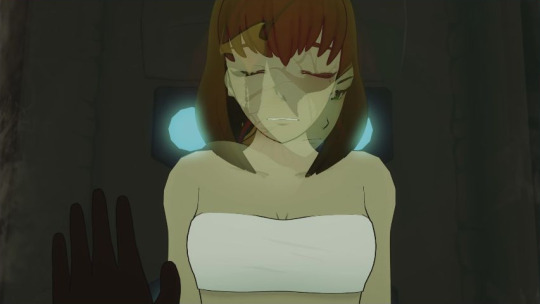
Animation has for a long time now struggled to crawl out of the stigma of appealing only to a younger audience. Combine that with internet animation in particular being very young compared to other film-making mediums, and you have projects within the platform that need to go through much trouble to make a name for themselves. RWBY is no exception to this, as from the beginning it has faced a lot of harsh ridicule by critics who are fans of anime, the very medium the web-series takes direct inspiration from. And despite having a growing fanbase and the production having come a long way in just five years, there are some aspects of the show that even much of its fans have neglected to refer to. If there’s one growing part of RWBY’s presentation that especially deserves mention. it would be the cinematography.
As stated previously, RWBY has always been inspired by and even aimed to emulate anime. As a cultural medium of entertainment, anime has been the pigeon-holed for its various tropes. The tsundere archetype, beach and hot spring scenes, shonen training arcs, transfer student character introductions, etc. And while the dismissal of seeing some the same tropes in many titles every season, every year is understandable, anime as a visual-storytelling medium has been cultivating itself for the past 60 years. With that much time, many names who have taken the positions of directors and storyboard artists in their careers alone have developed recognizable cinematic techniques. One example is Osamu Dezaki. Most may not have even heard of him due to his passing in 2011 or his works due to how old they are. But one may faintly recognize his techniques he pioneered that are casually sprinkled in many anime. Take the “postcard memories” technique for instance, a way of freeze-framing a shot into a hyper-detailed, sketchy still. It’s something meant to make the subject of such shots feel especially tense, mesmerizing or impactful and it can be seen in various works that some fans today have been exposed to like Sailor Moon, Kill la Kill, & One Piece.

And Dezaki is just one name that uses certain techniques to create a vision in anime titles. There are many others who have gone to either provide storyboards for or direct some shows and films well-known within anime fandom to this day. With Takuya Igarashi, the director of Ouran High School Host Club, Soul Eater, Star Driver, Captain Earth and Bungo Stray Dogs, his works commonly have vivid colors and lighting through windows and characters on symmetrically-opposed sides to convey the contextual mood. Then there’s Shigeru Yamauchi, the director of Casshern Sins, Dream Eater Merry, A Town Where You Live, the 8th, 10th, & 12th Dragon Ball Z films, Digimon: The Golden Digimentals, and a storyboard artist of episodes of many, many anime. Yamauchi is especially known for having whole scenes depict close-up shots of a character’s face or showing half of their bodies and having settings be done in a specific, sometimes monochromatic color schemes that feels like something out of a painting. There’s also Naoko Yamada, a name from studio Kyoto Animation who has developed a resume of directing shows and films like K-ON, Tamako Market & A Silent Voice that, despite them mostly having a moe vibe through the character designs, are deceptively-enriched in scenes shifting from bright, pastel colors to more dull colors to provide atmospheric moods and having characters express themselves not through their faces but other ways such as their legs.
There are far too many names to point to, but even ones who have yet to direct a whole anime, manage to apply their cinematic ideas into episodes of anime. Even something like Dragon Ball Super, a recent installment of a popular shonen franchise that’s often dismissed for having characters mindlessly flying and throwing beam blasts and fists, can be known for having episodes with competent stage direction depending on who is working on it.
With all of that said, it’s worth bearing in mind that RWBY, like the many anime it takes inspiration from, could also be credible for having and applying cinematic techniques. But this wasn’t always the case. Back in volumes 1 & 2, the process for storyboards would be led by Patrick Rodriguez, who is known for designing various characters in the show like Ironwood, Amber, & Tyrian, with the rest of the team consisting on Miles Luna & Kerry Shawcross, the writer and director of the show respectively and the animators. The problem however was that even with the storyboard team set up this way, scheduling was very tight, to the point where there was either little time or no time to make the boards for the show. Although the first two volumes were not entirely void of enticing shots, this led to needing to resort to basic camera shots and on few occasions, incomprehensible ones.
By volume 3 however, this process changed. Among the many changes in the production pipeline, one of them was the overhaul of the storyboard team to be led by Joe MacDonald, an animator during volume 2 who had nearly 30 years of experience in the creative entertainment industry, with a newly established team consisting specifically of storyboard artist. The second was introducing a complimentary camera & layout team, also led by Joe MacDonald with some of the storyboard artists overlapping. Finally, the third was creating a camera bible. To quote from one of the storyboard and layout artist, Rachel Doda, in the volume 3 audio commentary:
“It was mentioned earlier too in some other commentary, but we originally created like a camera bible or at least tried to create like, stage direction in terms of just… hey! Ya know, If it’s a shot of Ozpin, it has to be kind of stagnant because he’s the most level-headed. And if it’s a shot of Ironwood, usually, they just, ya know, it has to be like he’s in power. So the camera has to be low to the ground. Then, ya know, just like all the characters themselves. Qrow has a little hitch to stuff.”
Since volume 3, the camera served as was a big way to help express the position or mindset of various characters. Take the character, James Ironwood as referred to earlier. Compare most of his shots in volume 2 to his shots in volume 3 & 4, and the differences in his scenes will feel more apparent. Camera manages to communicate when he feels it’s important to be authoritative and when to be more reasonably submissive. And that’s the key word: “communicate.” If Rachel Doda’s words as quoted are of any indication, then multiple elements in cinematography such as lighting, color, transitions, framing, staging, & character posture could be at play to sell and help deeply interpret meaning behind character’s thoughts and intentions.
In the case of volume 3 where this major shift in the show’s direction began, there are several scenes that became very striking to this day. One of the biggest examples is this shot of Pyrrha witnessing the Fall Maiden, Amber in a comatose state in chapter 6. When watching it the first time, one may think that match-cutting from Pyrrha turning away to showing Cinder at the stadium is simply meant to indicate that Cinder is Amber’s assailant. But there’s also a matter of Pyrrha feeling bound to take a risk of having her destiny be Amber’s and not hers compared to Cinder who wants nothing more than to become the very thing the former hesitates to be. Pyrrha feels she can’t avoid any of this and is thus overwhelmed as shown in chapter 8 when she can no longer even attain peace of mind from a simple leaf falling towards her in a burning sunset, all of which from that point on referred to the Fall Maiden in her mind.
Though as much as volume 3 had its strong sense of visual direction, RWBY’s fourth volume arguably pushed the direction further through a variety of ways. While it has been criticized for spreading its story too thin by jumping between multiple plot points, some scenes in plot points tied to certain characters can contain some strong cinematography. Take for instance Cinder’s training scene in chapter 11, which by itself doesn’t seem to say much. But think about the Grimm she fought. They were a bunch of Beowulves and a Beringel, which are the same creatures of Grimm that Ruby Rose fought in the character short. Although Ruby takes longer to defeat her foes than Cinder, the former is shot to end her fight triumphantly while the latter is shown exhausted and has to catch her breath after her bout. All of this can be interpreted as an inadvertent way of presenting how even more salt is poured to Cinder’s wounds.
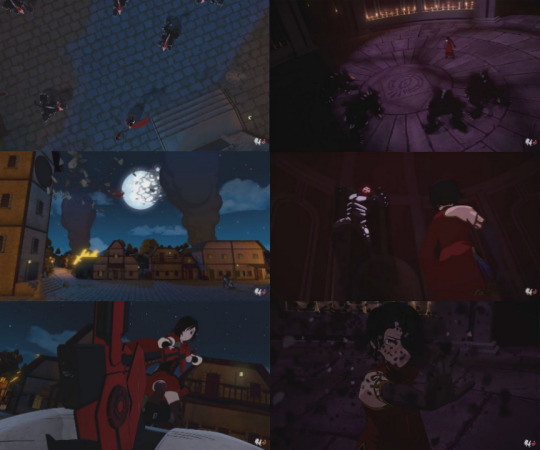
Another example in volume 4 are scenes of Weiss in the Schnee mansion in chapters 2 & 11. When comparing side-by-side, the shots themselves are practically the same but with three key differences. The first is the lighting, the second is Weiss’s facial expressions and body language, and the third is the fact Klein is accompanying her in the same shots in chapter 11. These shots show very effectively-opposite meanings with Weiss’s character who is first seen feeling lonely and submissive despite being in a fancy, spacious, brightly-lit home only to be feeling more defiant and at-ease when she has Klein to help her escape the home we learn she hates.
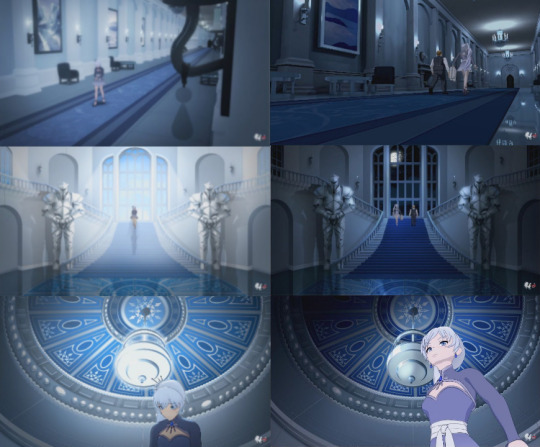
It’s this use to linking shots in different episodes that also sheds light to the context of the song “Mirror, Mirror”, which frankly never made much contextual sense up until this point. How can someone who carries pride in her family name be the loneliest of them all as the lyrics go? Well, this visual direction sums up why. Her father and his business-oriented ambitions created a growing rift in her family and she needs someone she can trust to be empathetic towards what she’s feeling. This is also why she felt hurt when she found out Whitley never really intended to look out for her. Combine these moments with shots of her witnessing the Atlas ships passing by her window in chapters 1 & 7, only to finally manage to leave in one by chapter 12, and you have a phase of Weiss’s character story packed with meaning.
There’s also quite a few cinematic techniques regarding Qrow in volume 4. One of the biggest cases is the use of a low light by his side with whoever he talks to about Salem. In times where connection to other Kingdoms in the World of Remnant are cut-off, Qrow welcomes or advises cooperation with other characters out of necessity. Warm lights such as lamps and campfires help illustrate this. With Qrow and Raven in chapter 4, the lamp on the table is closer to the former than the latter who only wants specific information and will otherwise walk away (or make a portal in her case) towards the darker side of the Tavern. And then there’s chapter 8, where Qrow informs team RNJR with as much information about everything to do with Salem and the fall of Beacon as possible, leading to well-presented shots of Jaune stepping briefly outside of the campfire due to his anger and wavering trust. Even this shot where he bluntly referred to Qrow’s motives as using his teammates as bait is framed to show his stance on who he was looking out for and who he wasn’t. Most interestingly though, is this shot here of Qrow framed to be surrounded by the campfire as he describes his semblance. While the cinematic techniques in some scenes can be admittedly up for debate, this shot was actually confirmed by Kerry Shawcross in the volume 4 director’s audio commentary to have been drawn by Rachel Doda and was highly approved after going through every department in the production.
“We uh, the shot inside the fire, was definitely one of the shots that we had uh, Rachel had the idea to do while we were boarding, Rachel Doda. And uh, I told her, “absolutely draw that! I make no promises that’s going to make it all the way through. But every next department after that I explained the shot and it was like, “no, we should do that!” Um, so yeah, it was one of those things where it was like, it was just such a beautiful shot that everyone wanted to make it happen and everyone went out of their way to make it happen.”
One of strongest cases of visual techniques applied though was in the forest scene in chapter 2. Here, we see Jaune, an often talkative character in previous volumes, be unusually silent and uttering only shouts and out-of-breath exhales as he trains through Pyrrha’s recording. He is mostly alone in the dark forest with shades of dark blue and green and bright, blueish lights illuminating his armor. Most fans who see this scene are struck by the music and Pyrrha’s words and Jaune’s determined, yet saddened facial expressions. Alone, those aspects are effective at the scene being a tearjerker. But there’s one other element, a visual one that can add a whole level of meaning: the fireflies.

In Japan, fireflies are theoretically that of Hitodama or “human souls” drifting in the night when away from their bodies. If we were to apply this motion to the forest scene in chapter 2, then the fireflies could be visually representative of the lives lost in Shion village. Thus what Jaune could’ve felt was not sadness for not being able to stop Pyrrha, but for being unable to do anything about tragedy of the villagers. Now to some, such an interpretation may be considered reading a little too much. While that response is fair, bear in mind that the villages seen in volume 4, Shion, Higanbana, Oniyuri and Kuroyuri are all named after flowers with specific meanings in Japanese, the matter of fireflies being that of human souls may not be that unlikely.
“I’m just tired of losing everything.” - Jaune Arc
If there’s any set of scenes that are arguably as striking in visual direction as in chapter 2, if not more-so, it would be in scenes of Ren and Nora in chapters 10 & 12. There’s the matter of how the reveal of Ren’s semblance after cutting from the shot of the lotus flower is representative of how a real lotus flower can bloom after being submerged in mud. There’s also the shots of Nora desperately holding on to Ren’s hand, one of which is out of fear of being left alone when they were kids while the other is to prevent Ren from risking being killed due to anger and reckless abandon. But probably the most powerful moment of stage direction is of this moment here.
youtube
That there concisely explains what Nora means to Ren. Bear in mind, Ren is a very quiet, calm & collected character. He’s the opposite of Nora in that regard, who wears her enthusiasm on her sleeve and openly express how much she enjoys Ren’s company. But up until this point, we hardly seen Ren’s perspective about Nora other than the occasional subtle smile at her antics. It’s not until the scene underneath the house in chapter 12 that we see what Ren sees when Nora is deeply saddened to the point of being in tears, something viewers have never seen her current express before. In his mind, Ren briefly sees the same frightened girl who he first met and swore that they would keep each other safe. He is all Nora has and if he realizes that if he gets himself recklessly killed, then she’ll be alone all over again. And that’s the last thing Ren wants to happen.
Even after all of this is said and done, there’s still more examples of scenes with visual direction to be unpacked and interpreted in volume 4 alone. But those can be talked more depth another time as they help compliment scenes in the focus of the next subject to be talked about in part 2.
#rwby#rwby6#rwby analysis#crwby#rwby5#cinematography#storyboards#rachel doda#rachel#doda#kerry shawcross#kerry#shawcross#joe macdonald#joe#macdonald
25 notes
·
View notes
Link
Author Connections Posts
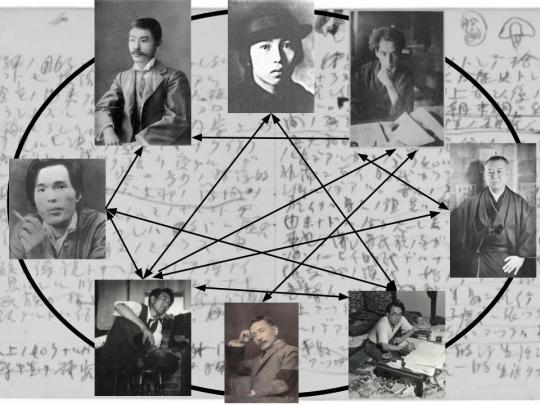
There has been a common theme in the asks I have received in the past couple days, so I created a tag for it! “Author Connections” is how the real life authors interacted in life and how their lives are similar to each other. I went through my whole blog and tried to tag everything that pertained to this, so feel free to check it out!
In case you want more explanation on the image:
Authors starting at the top, center and moving in a clockwise direction: Nakahara Chuuya, Akutagawa Ryuunosuke, Tanizaki Junichirou, Sakaguchi Ango, Natsume Souseki, Dazai Osamu, Oda Sakunosuke, Kunikida Doppo.
🖊️Odasaku read Kunikida
🖊️Odasaku, Ango, and Dazai hung out and made up the three main Buraiha authors (obviously a connection referenced a lot in the anime)
🖊️Chuuya and Dazai worked on a magazine together once and hated each other after that
🖊️Akutagawa read Kunikida and Souseki
🖊️Natsume Souseki wrote a letter to Akutagawa praising his short story “The Nose” and saying he will become a great author
🖊️Akutagawa and Tanizaki had an argument about plot’s necessity in a story
🖊️Chuuya and Ango got in a fight at a bar over a pretty waitress
Natsume Souseki is basically related to everyone, he’s so influential, but I didn’t put arrows because that would clutter the picture. All of them read Souseki and many made direct reference in their writings to things he wrote.
🖊️Dazai was a major Akutagawa fanboy
🖊️ Tanizaki was on the jury for the first Akutagawa Prize and judged Dazai’s story he submitted
🖊️ Dazai wrote Odasaku’s eulogy in the paper and blamed the literary critics for his friends death
🖊️ Dazai’s older brother told him he should read better literature and suggested Tanizaki
Also, the handwriting background is taken from a page of Dazai’s student notebook from the handwriting posts I made a while back.
127 notes
·
View notes
Text
Panem Et Circenses

Roma’s monologue from the latest chapter was what interested me the most more than any bloodshed depicted. (Yes, even more than Urie getting owned.) In particular her light reference to a latin phrase.
Bread and Circuses or “Panem Et Circenses”, it’s a phrase used to describe appeasement of the masses, most particularly in the form of government. That public approval is best gained not through exemplary of excellent public service and police, but through distraction and satisfaction of the most immediate and shallow desires of the populace.
The phrase itself originates from Rome in Satire X of the roman satirical poet Juvenal (about AD 100), citing what the roman populace cares about, forgoing both it’s historical birthright or political involvement. In 140 BC. Roman politicans passed a series of laws to keep the votes of poorer citizens, by introducing a grain distribution, and easy to access entertainment [x].
It’s also important to remember that Roman culture is based upon the culture of the Greek City States (most importantly the surviving culture of Athens), and for Latin culture the concept of every citizen having not only a right, but an obligation to participate in government. Athens was a direct democracy where all able bodied citizens had to paricipate, vote, sit in juries in order for the government to function. Rome was a republic, and then an empire, but still in those days there was a sitting senate and opportunities for even commoners to participate in government as long as they were citizens.
Basically, it’s a very latin idea (that is combined Greek and Roman), that the improvement upon society relies on individuals stepping up to contribute. Therefore the mass of the government those who wield power, and the masses those who are subjected to power is almost one in the same. However the pacification of the masses, that is supplying them with bread and distraction to fill their most surface needs and stop them from rising up themselves while it helps a certain amount of individuals secure power, leads to the downfall of society.
What, I wondered did he mean by society? The plural of human beings? Where was the substance of this thing called “society”? I had spent my whole life thinking that society must certainly be something harsh and severe, but to hear Horiko talk made the words “Don’t you mean yourself?”, come to the tip of my tongue. [...] What is society but an individual?
Osamu Dazai’s, No Longer Human
119-120
What Juvenal is satirizing is the decline of individual heroism, in favor of the satisfaction of the masses. Individual heroism in a sense of the ability of a single individual to stand up and make a difference in its simplest of terms: agency.
… Already long ago, from when we sold our vote to no man, the People have abdicated our duties; for the People who once upon a time handed out military command, high civil office, legions — everything, now restrains itself and anxiously hopes for just two things: bread and circuses
(Juvenal, Satire 10.77-81)
This idea of certain forces being used to pacify the masses to make them easier to control is something that appears again and again in philosophy. Nietzsche accused Christianity of fostering a slave morality,
“I finally discovered two basic types and one basic difference. There are master morality and slave morality. . . . The moral discrimination of values has originated either among a ruling group whose consciousness of its difference from the ruled group was accompanied by delight - or among the ruled, the slaves and dependents of every degree [...] The Christian faith is from the beginning a sacrifice: sacrifice of all freedom, all pride, all self-confidence of the spirit, at the same time enslavement and self-mockery, selfmutilation …”
Nietzsche - Beyond Good and Evil
Nietzsche accused Catholicism of suggesting that by making our most cherished values originate not among those who were the best and brightest of their times, but among those who were the most oppressed and impoverished. That this encourages not pride in oneself and one’s own achievements but rather pride in keeping your head down and surviving. Therefore people are encouraged not to be revolutionary but to be ordinary.
Jesus’ statement itself presents a paradox. “If the meek aren’t meant to inherit the earth, they cannot do this by remaining meek.”
Of course religion asks for faith that all suffering and losses endured in this world will be rewarded in the next one. It can quickly look like an excuse for further suffering in this world, hen people could just as easily work to make a paradise out of this one.
Nietzsche calls this idea “Slave Morality”. It’s obviously connected with the dynamics of power.
Karl Marx in his critique of Heigel wrote this:
"Die Religion ... ist das Opium des Volkes" and is often rendered as "religion... is the opiate of the masses."
Karl Marx
The full quote in context is this, though.
Religious suffering is, at one and the same time, the expression of real suffering and a protest against real suffering. Religion is the sigh of the oppressed creature, the heart of a heartless world, and the soul of soulless conditions. It is the opium of the people.
The abolition of religion as the illusory happiness of the people is the demand for their real happiness. To call on them to give up their illusions about their condition is to call on them to give up a condition that requires illusions.
In essence, if people were to abolish their habit of simply looking for happiness to distract them from suffering, or even their need to give reason and justice to suffering which is by its nature unjust, then people could directly look at the suffering and then deal with it.
Of course it’s not that simple, but this is philosophy and philosophy likes to deal in conjecture and abstract terms.
As shown through Juvenal, Nietzsche and Marx, the tendency of the masses and therefore individuals to forgo deeper reasons to live for instead more on the surface pleasures is what leads to their own ability of making their will manifest.
It’s all about individual agency. This is a theme that too, comes up time and time again in Tokyo Ghoul. Furuta, perhaps in reference to V’s many own roman references describes basically this as the way that V corrals the masses in “66- Old Guard.”

He mentions both things, food and distraction. Kuzen similarly, says that in his early life with V that he was supplied with a safe dwelling and all the food that he could eat in return for completing their heartless tasks for them.

Kuzen describes it in different words, but what he feels before meeting Ukina is in essence the same problem that plagued Roma as she was growing up: He was bored.

Boredom is another word for fulfillment, even if it’s not as poetic. Roma had no parents, no point of attachment, no people in her life no reason to continue living and yet she did. She looked at it and said why? Then she looked around her and saw nothing but people distracting themselves.
Roma was both disgusted, and envious. Envious that they had the opportunity to distract themselves despite being such weak and frail creatures yet she who had been fighting for her survival all this time did not have such a luxury. So Roma made humanity her distraction.
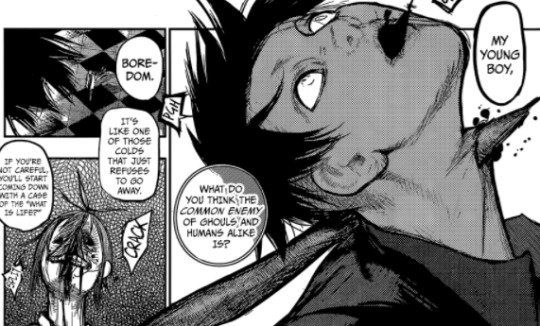
Roma calls the common enemy of humans and ghouls “boredom” itself. Probably not something Urie could immediately sympathize with, but look back what exactly is Urie’s entire quest for anyway?

To have his own existence affirmed. Without it, Urie was merely lost. Donato had to ask for him the questions he was putting off asking for so long. He simply suffered without reason.

Urie’s quest is one for an individual identity outside of his father’s. He is plagued by the same questions then we all are, “Why am I fighting? Why was I born? Why do I exist?”

His answer to this so far though has been to surrender his sense of identity to the CCG above him, and hope that through ascending the hierarchy therefore he will get the affirmation he so desperately desired. He too was bored in a way. He did not have a reason to stand or fight. Too weak to stand on his own feet and fight for his own reasons and therefore he surrendered his power to a higher system and hoped the would make the decision for him.
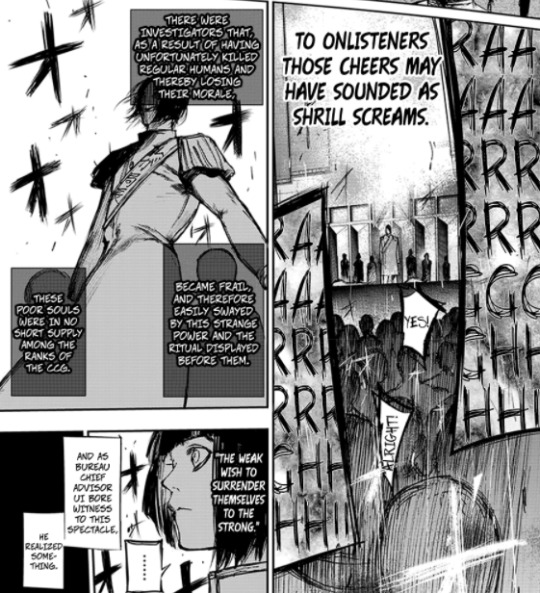
“The weak wish to surrender themselves to the strong.”

Fura notices this same pattern in Sasaki and Arima themselves, he defines a good person as somebody who can struggle with and accept an answer they find themselves, while the opposite of that is somebody who accepts an answer from on high and nods “Yes, I understand.”

That people who are therefore mentally troubled by what they do are actually healthier than those who aren’t. At which point we reach the final panel of Roma’s monologue, where she casts Kaneki and Furuta in the same role. Conductors of a meaningless parade who aren’t going to bring any meaningful change to the world.

Why is it that the both of them in Roma’s mind, are different from Aogiri who stated that they actually believed in a world for ghouls, an answer that bored her?
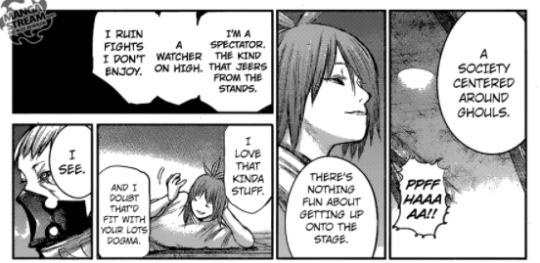
Is it because they too, just like Roma but unlike Tatara and Eto of Aogiri have no true intention of destroying the cage placed around them, no care to follow through on the future that the both of them promised to their respective sides. “A perfect world without ghouls” and “A world where you walk freely up above.” They are completely different promises but at the same time they are in essence promising the same thing. Bear with it for now, and the world will be better.
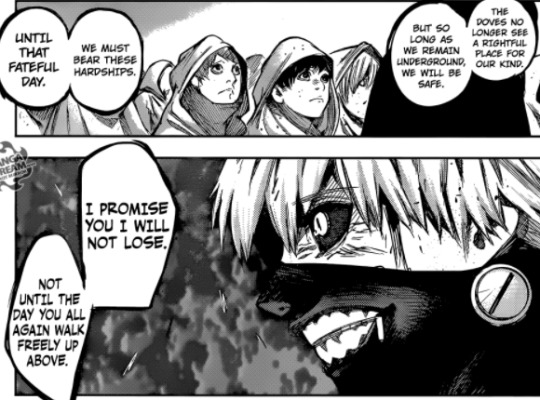
Perhaps it’s because Furuta and Kaneki both on their opposite sides of the game create exactly the kind of gameboard that Roma enjoys to dwell in. That they both lead the masses through distractions and promises, showmanship rather than substantive leadership that might actually bring a better change to the world.
Furuta sets up a scoreboard, publicizes the gory details of the CCG, sets up executions on the streets as a way of inciting the masses. Kaneki en masse dumps broken Quiqnues in front of the crowds even as they are starving for food. Both of these are demonstrations, put on to convince the crowd.
They only requires the masses to secede their agency to them, their individual will, to tie their strings collectively to both Furuta and Kaneki, and in return these two kings will supply you with what you need.
Roma calls both of these so called revolutions for what they really are, “parades” simply a conflict to entertain the masses on both sides and distract them from the suffering of their lives rather than actually addressing it.
The common evil then shared between humans and ghouls is not their propensity towards violence, but rather their propensity towards boredom. Attempting to fill the void of their meaningless existences causes them to stumble blind through their own lives rather than acting individually and with purpose.
250 notes
·
View notes